The Good Life & the Good Olive Oil
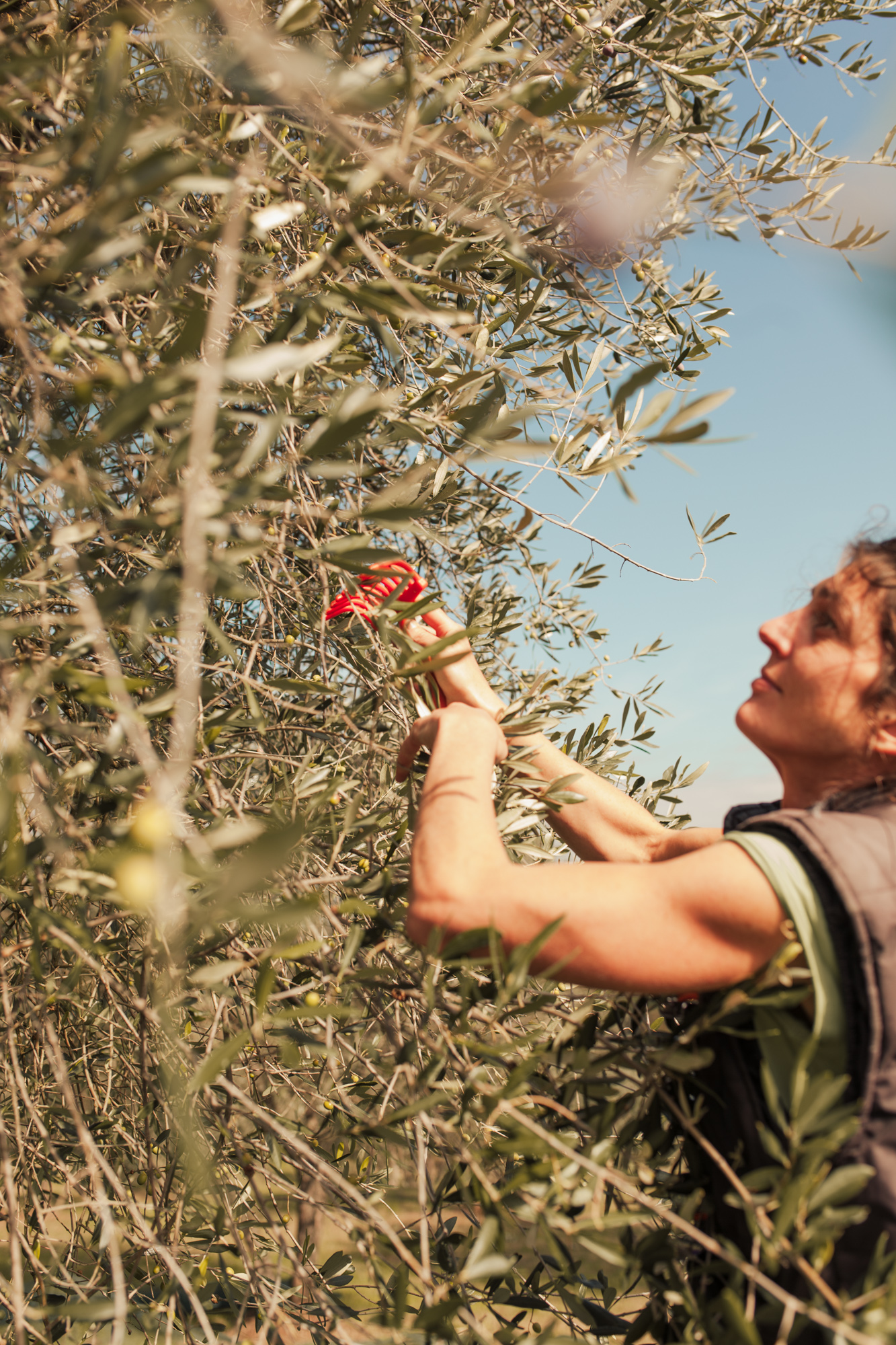
Photos and words by Katie McKnoulty
A young Italian couple living in New York swapped the big city for smalltown Tuscany, establishing an organic, sustainably-produced Tuscan olive oil business.
The sun finally comes out after a grey morning picking olives. Someone gets out the portable speaker and plays the kind of cool, vaguely indie music I or any New Yorker or Londoner in their 30s would listen to at home or work any day of the week. It's just that we’re listening to it here, in a field full of olive trees, in the Tuscan countryside. Francesco, who’s running this show, notices this golden, surreal moment too and turns to me and says, "People sometimes look down on agricultural work... but I mean, look how much fun we’re having!”
I'd come here to Tuscany to stay with Francesco Piattelli and his girlfriend, Francesca Gambato (Fra + Fra as they sign off their emails). I wanted to see and photograph the harvest of their 4.5 hectares of olive trees in the heart of the Toscano IGP denomination, and their olives, ready to be hand-picked and pressed. Their new venture is Agricola Maraviglia: a small-batch, organic, sustainably-made olive oil to be sold direct from their farm in Tuscany to consumers online all over the world.
![]()
![]()
Francesco, left, Francesca, right, in Monte San Savino, Tuscany.
Like myself, the couple gradually swapped big city life (New York in their case) for something much smaller, a farmhouse just outside the town of Monte San Savino in Tuscany, Italy. At first they visited half the year. Now with the pandemic, they’re here year-round in Tuscany.
"I realised that this (New York City) was not a sustainable way of life for me, for my energy, my stress levels... I could feel it; this is not what or how I wanted to live. And especially work-wise I wasn't feeling satisfied, I wanted to do something that was more aligned. I decided... first I'll stop and then I'll figure out what I want to do."
![]() The table set for lunch at Maraviglia, in between olive picking in the fields.
The table set for lunch at Maraviglia, in between olive picking in the fields.
![]() Maravaglia, perched on a hill outside the town of Monte San Sevino in Tuscany, a retreat centre in summer.
Maravaglia, perched on a hill outside the town of Monte San Sevino in Tuscany, a retreat centre in summer.
Francesco started with the creation of Maraviglia Conscious Living, where yogis and meditators would gather in the summer to taste a bit of that calm, good-for-the-soul Italian countryside life, along with Francesca's traditional-Italian-meets-plant-based cooking daily.
This gave Francesco a chance to come home to himself.
![]()
![]()
![]()
Tuscan kale fresh from the vegetable garden.
![]()
![]()
![]() Quince tree at Maraviglia.
Quince tree at Maraviglia.
When I visited in late October, the leaves and the weather had turned, so the focus too had turned to the business of making olive oil. Francesco and Francesca had gathered friends and family ready to work; they stayed together in the retreat centre and picked olives for eight hours a day for those few weeks of the harvest. Returning tired and hungry after sundown each evening, we'd share a big, communal meal around a long table with lashings of fresh green olive oil on top of everything. We'd go to bed by 10 pm every night in preparation for another day. Lunches were out in the field over a fire, or at home devouring Francesca's heavenly yet down-to-earth culinary creations.
![]()
![]()
![]()
The olive-picking crew on a lunch break out in the fields.
![]()
![]()
![]()
![]()
Lunch back at Maraviglia, eating dishes made by Francesca with ingredients from the garden: tuscan kale and pecorino crostini toasts, radicchio and ricotta tart and fresh green salad, liberally drizzled with Agricola Maraviglia olive oil.
I saw firsthand how hands-on the process of olive picking really is, something I'd never stopped to think about in my many years consuming it. I learned that you don't so much pick olives as you do shake and comb the trees, either with a machine if you're going high-tech, or with a mini rake in hand if you're going analogue. You then catch the falling olives with huge nets spread out on the ground below.
![]()
![]()
![]()
![]()
![]()
![]()
![]()
![]()
Olive Oil Made Differently
While this is the same picking scene you see all around Italy this time of year, after the grape harvest but before mushroom and truffle hunting season, these particular olives are destined for a slightly different course.
The trees are nurtured, organically, year-round by Francesco himself. Once picked with care, early and green, they are rushed to the mill to be cold-pressed into oil within 24 hours of picking to ensure freshness.
All this care and attention results in olive oil with a strong flavour all its own. I’ve learned since living here in Italy that this is the secret to Italian cooking – good quality olive oil with its own flavours makes simple dishes taste incredible.
![]()
A young Italian couple living in New York swapped the big city for smalltown Tuscany, establishing an organic, sustainably-produced Tuscan olive oil business.
The sun finally comes out after a grey morning picking olives. Someone gets out the portable speaker and plays the kind of cool, vaguely indie music I or any New Yorker or Londoner in their 30s would listen to at home or work any day of the week. It's just that we’re listening to it here, in a field full of olive trees, in the Tuscan countryside. Francesco, who’s running this show, notices this golden, surreal moment too and turns to me and says, "People sometimes look down on agricultural work... but I mean, look how much fun we’re having!”
I'd come here to Tuscany to stay with Francesco Piattelli and his girlfriend, Francesca Gambato (Fra + Fra as they sign off their emails). I wanted to see and photograph the harvest of their 4.5 hectares of olive trees in the heart of the Toscano IGP denomination, and their olives, ready to be hand-picked and pressed. Their new venture is Agricola Maraviglia: a small-batch, organic, sustainably-made olive oil to be sold direct from their farm in Tuscany to consumers online all over the world.
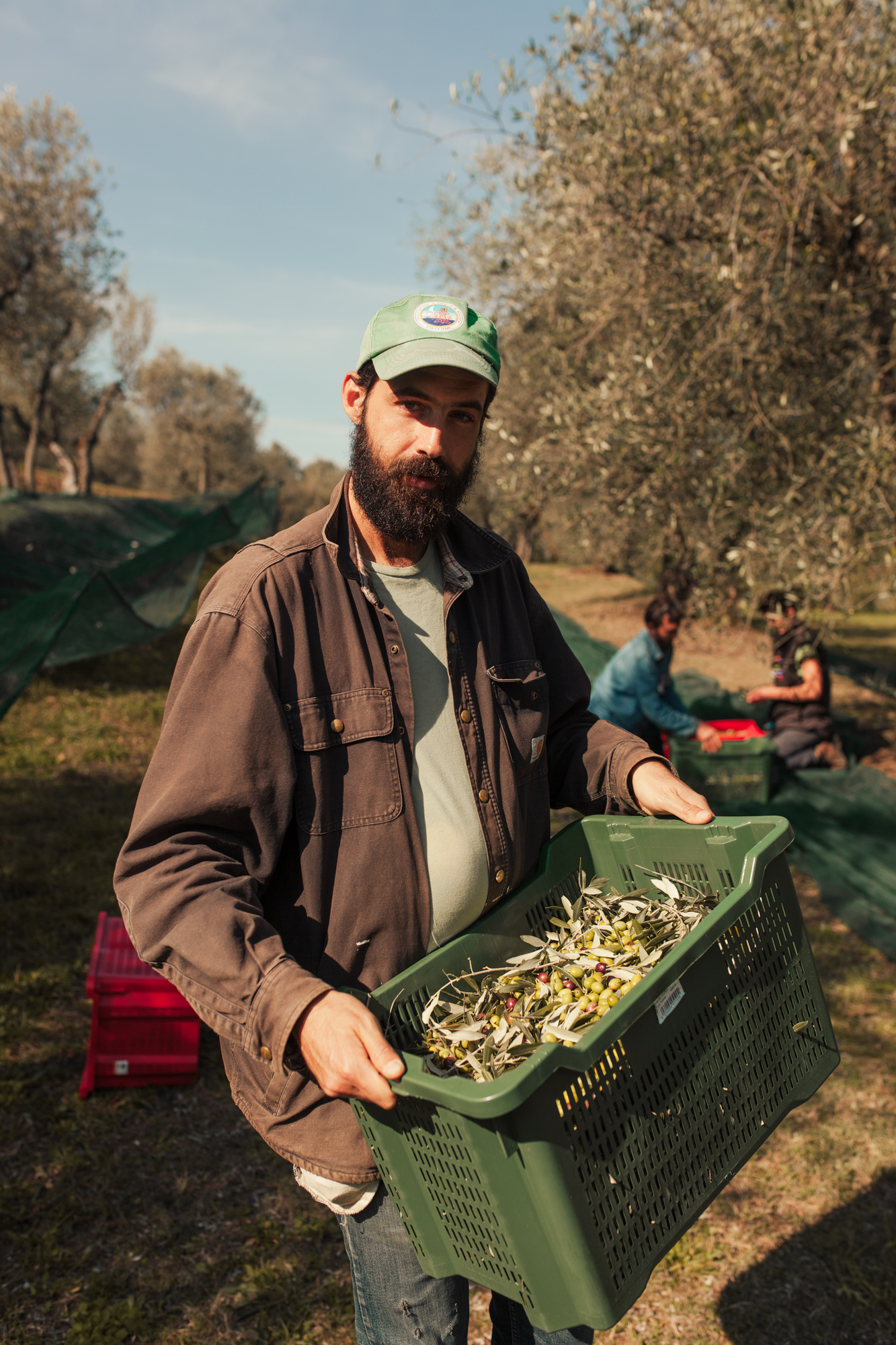
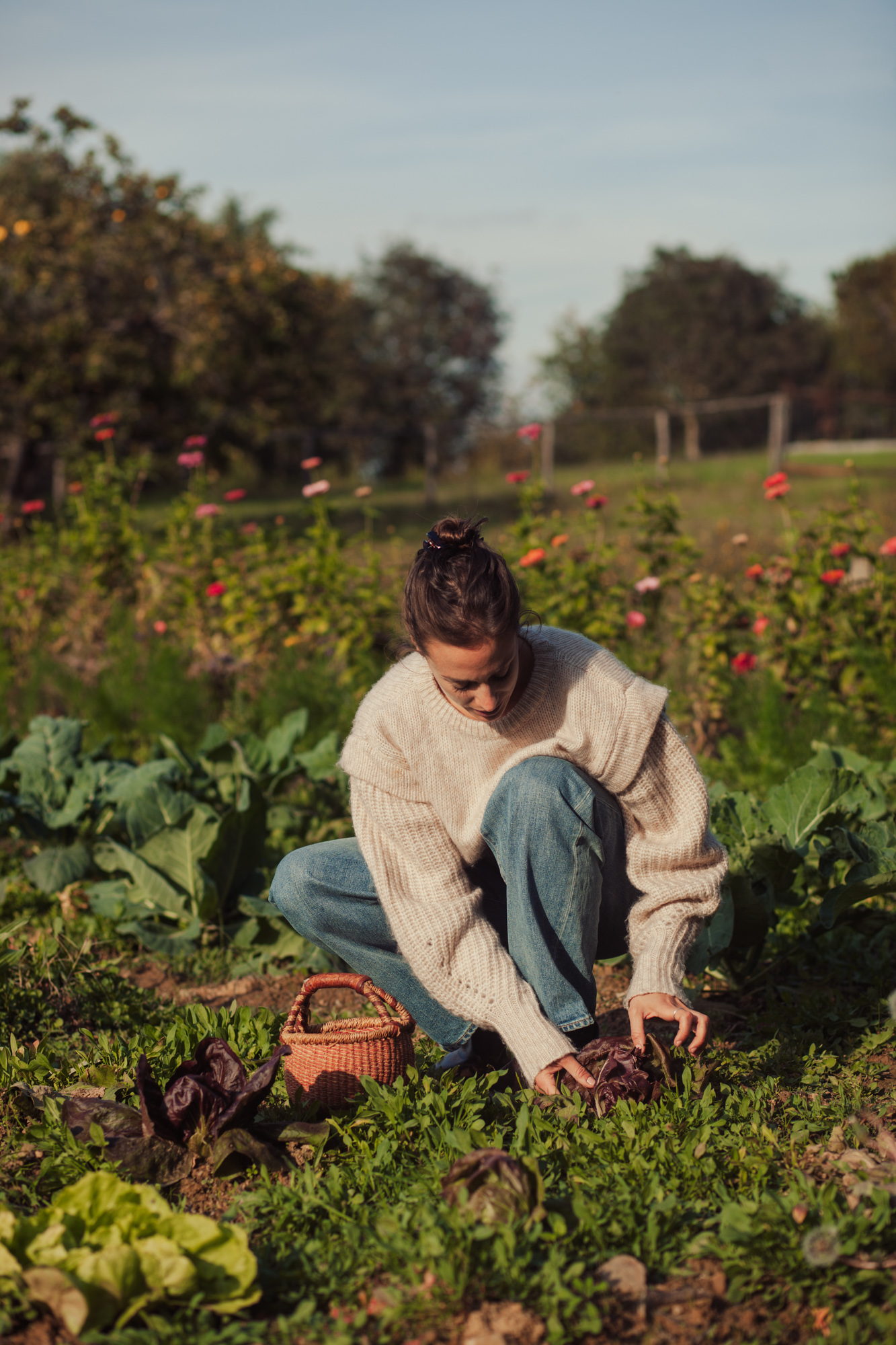
Francesco, left, Francesca, right, in Monte San Savino, Tuscany.
Like myself, the couple gradually swapped big city life (New York in their case) for something much smaller, a farmhouse just outside the town of Monte San Savino in Tuscany, Italy. At first they visited half the year. Now with the pandemic, they’re here year-round in Tuscany.
"I realised that this (New York City) was not a sustainable way of life for me, for my energy, my stress levels... I could feel it; this is not what or how I wanted to live. And especially work-wise I wasn't feeling satisfied, I wanted to do something that was more aligned. I decided... first I'll stop and then I'll figure out what I want to do."
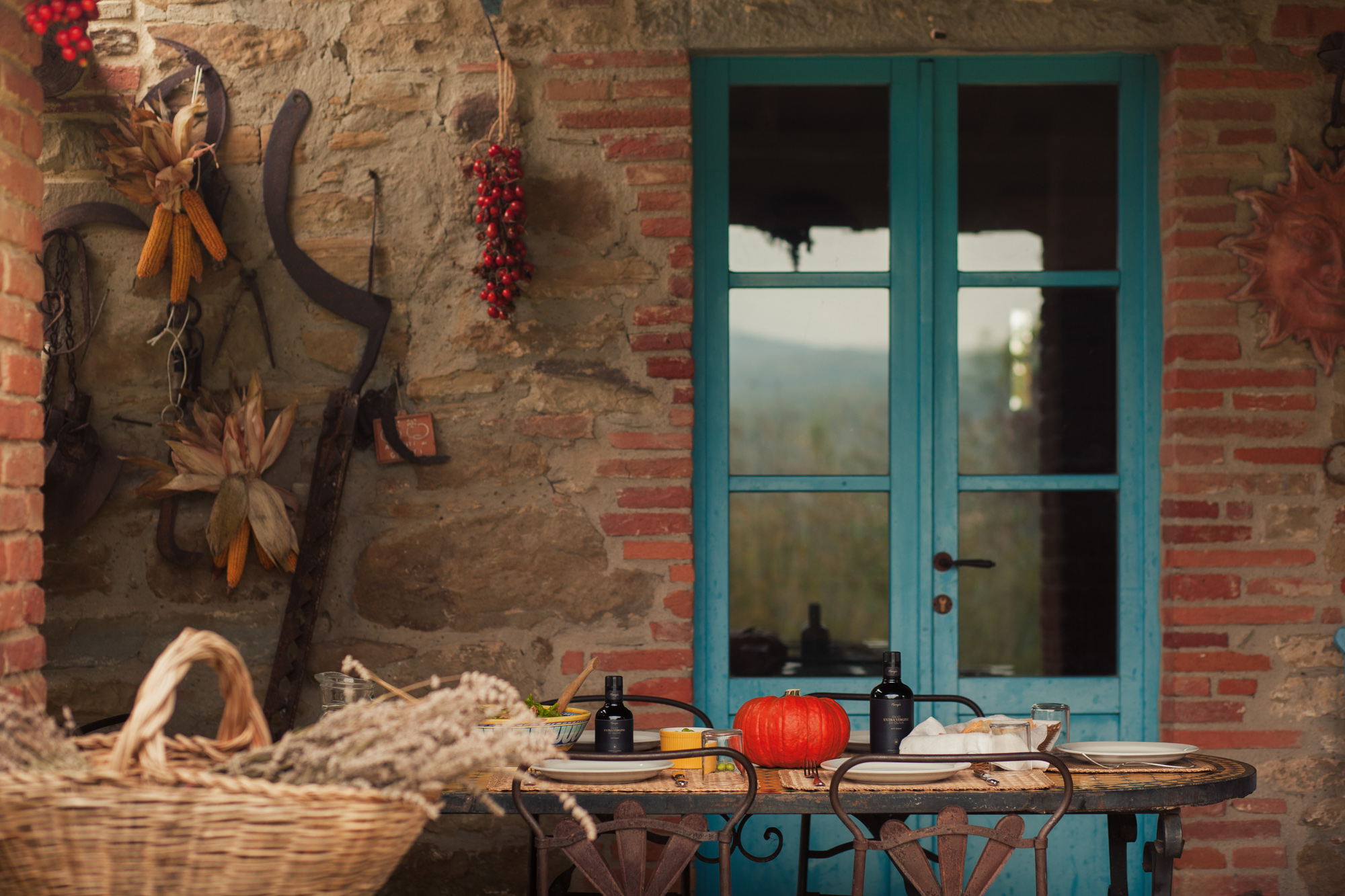 The table set for lunch at Maraviglia, in between olive picking in the fields.
The table set for lunch at Maraviglia, in between olive picking in the fields.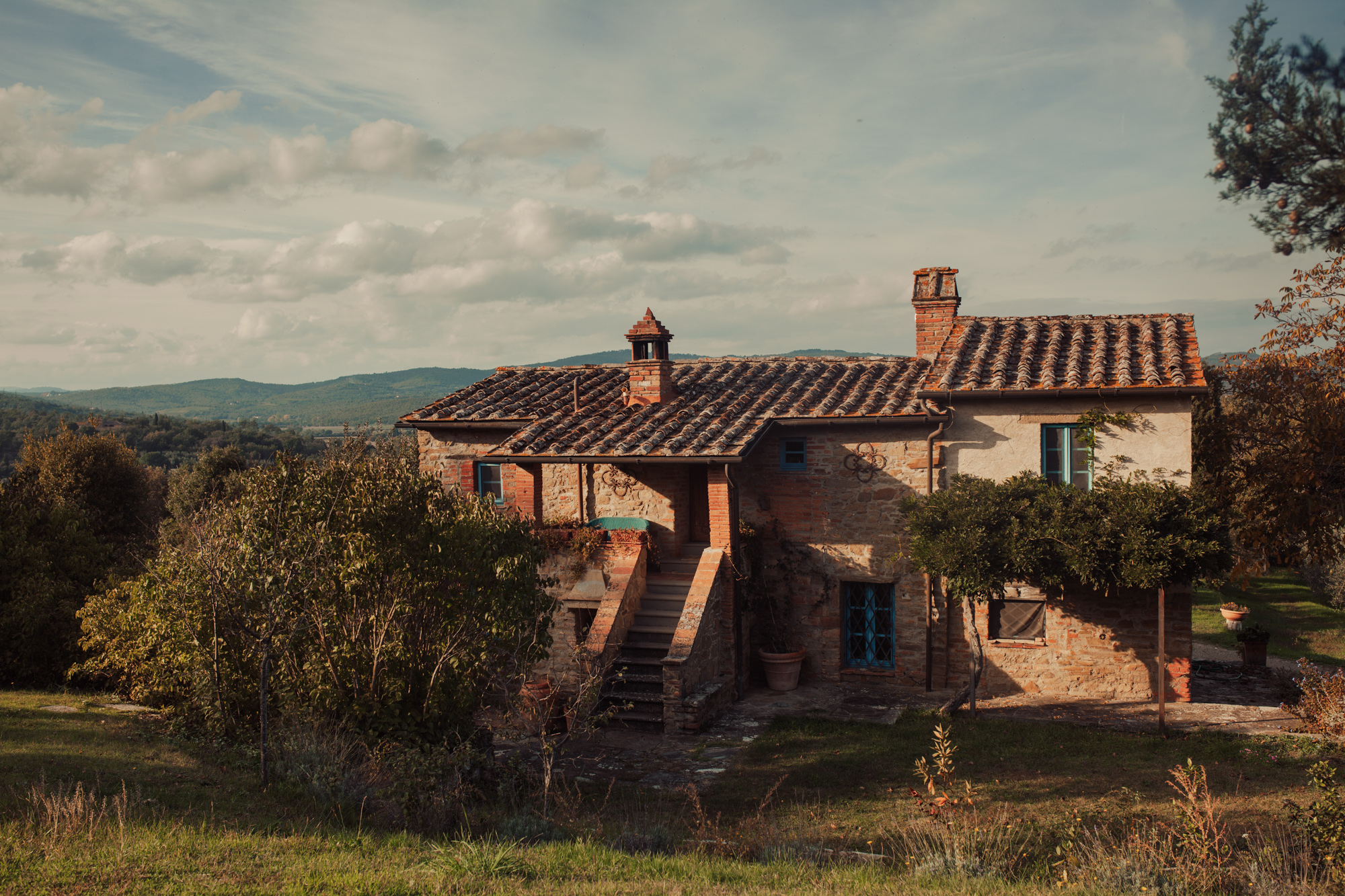 Maravaglia, perched on a hill outside the town of Monte San Sevino in Tuscany, a retreat centre in summer.
Maravaglia, perched on a hill outside the town of Monte San Sevino in Tuscany, a retreat centre in summer.Francesco started with the creation of Maraviglia Conscious Living, where yogis and meditators would gather in the summer to taste a bit of that calm, good-for-the-soul Italian countryside life, along with Francesca's traditional-Italian-meets-plant-based cooking daily.
This gave Francesco a chance to come home to himself.
"I came here because I wanted to slow the pace of life, I was like 'OK I'm going to start this retreat centre that can also be a bit of a temple for myself and a hub to bring together people that I like.' And then living there, you see every season, you see the trees, they bloom and they fall and the energy is just so palpable and so strong... The love for olives and nature, it came after. It's something that surprised me."
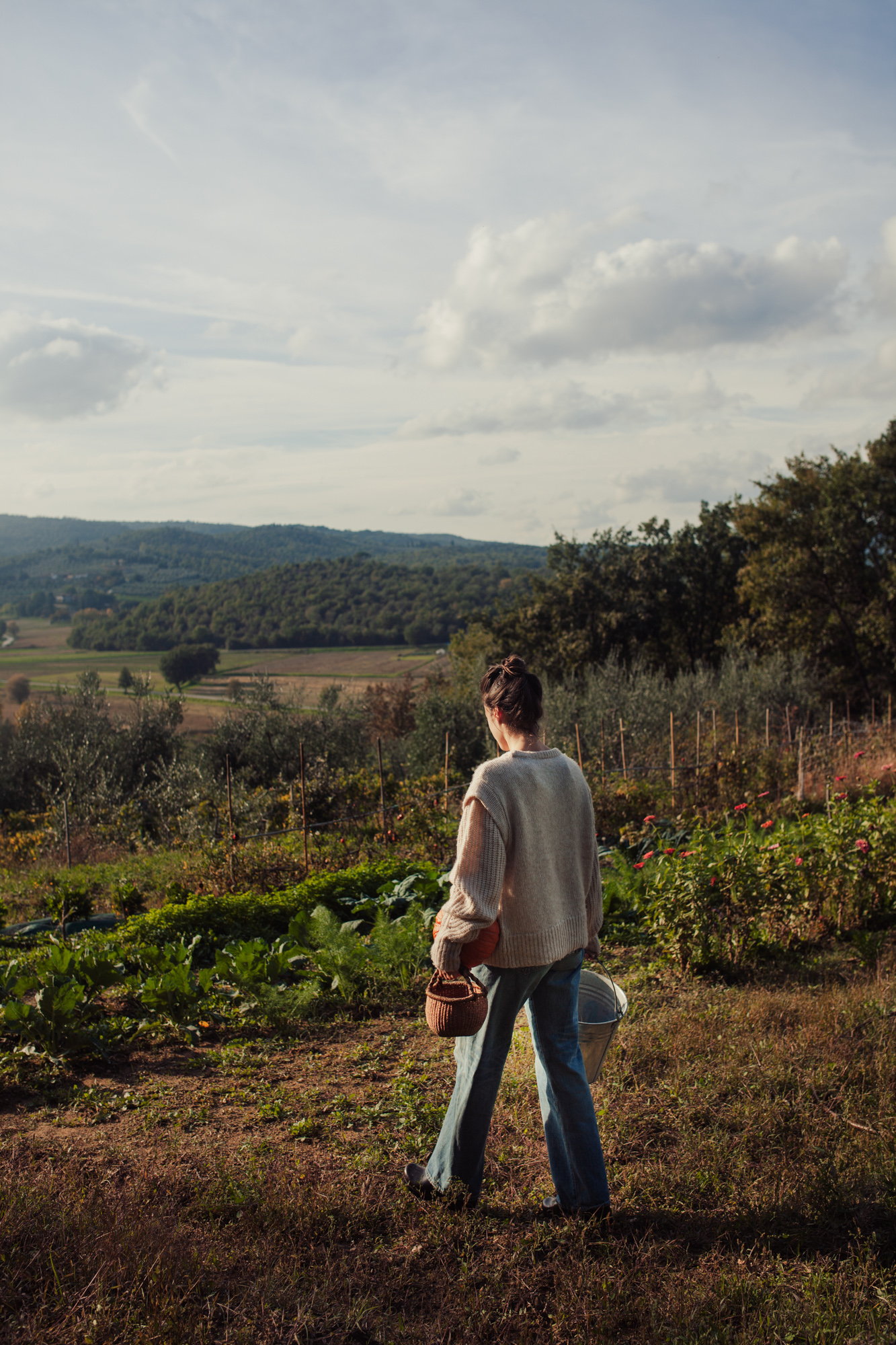
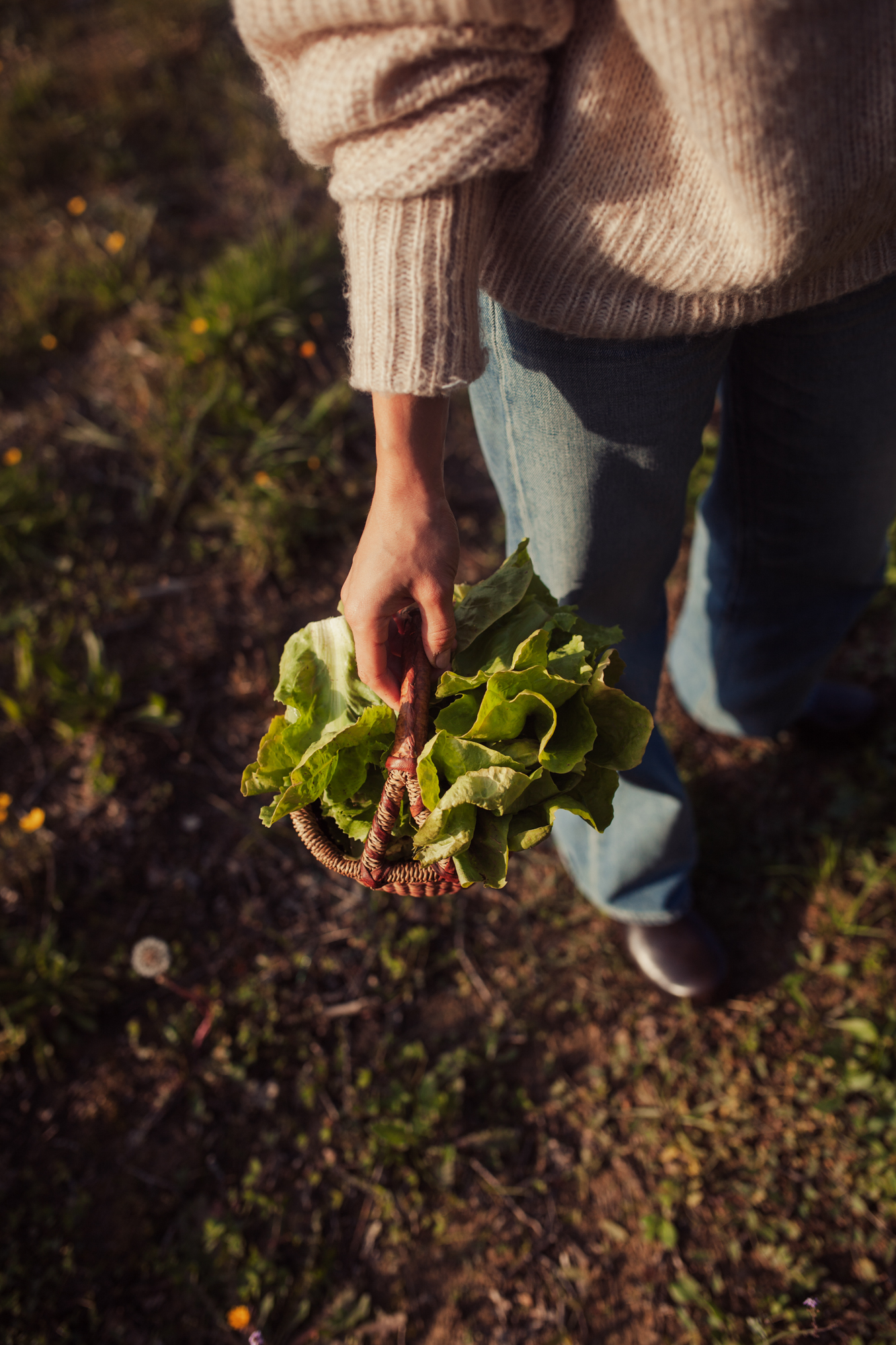
Francesca harvesting the day’s produce for dinner in their considerable vegetable garden.
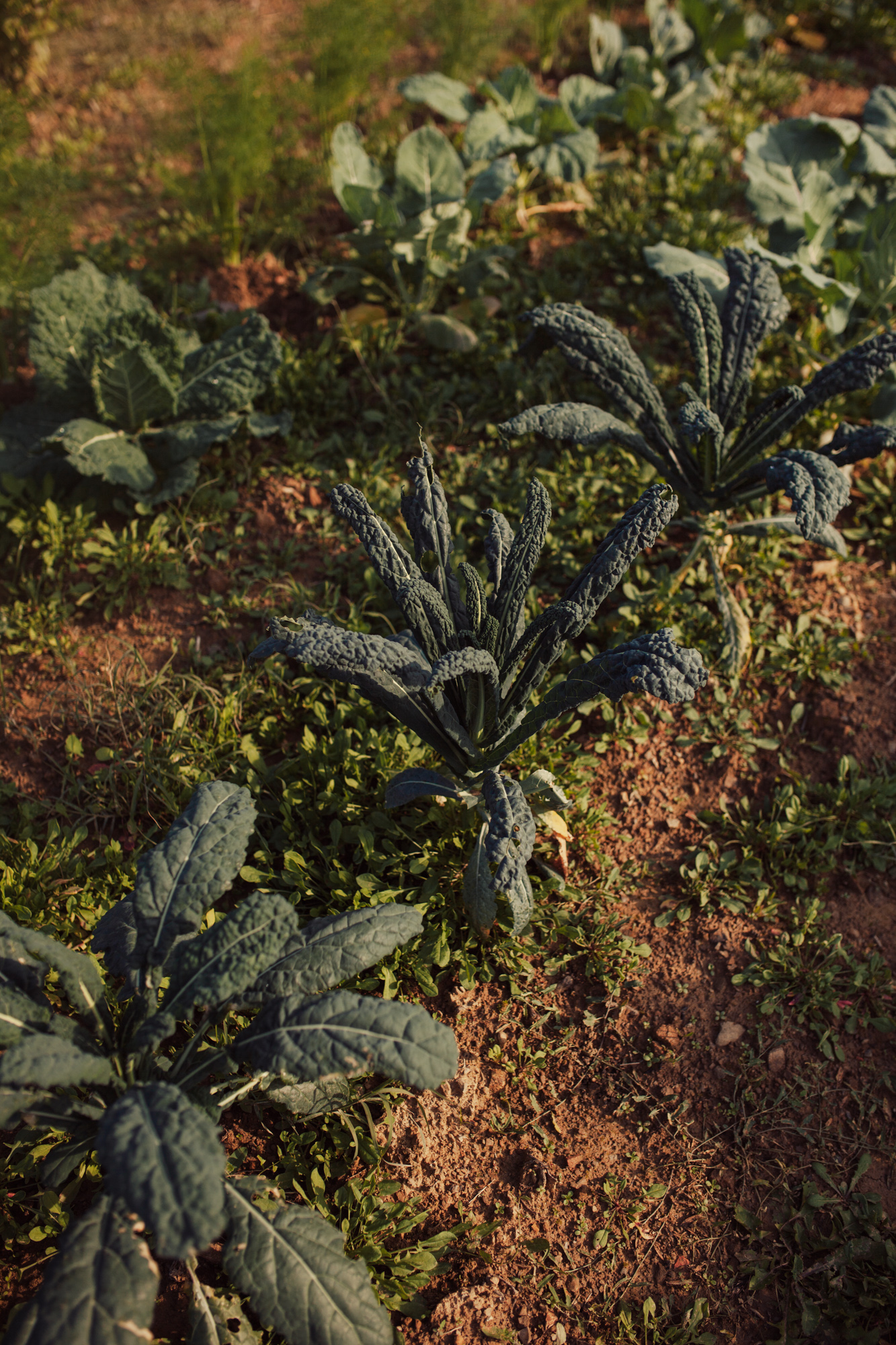
Tuscan kale fresh from the vegetable garden.
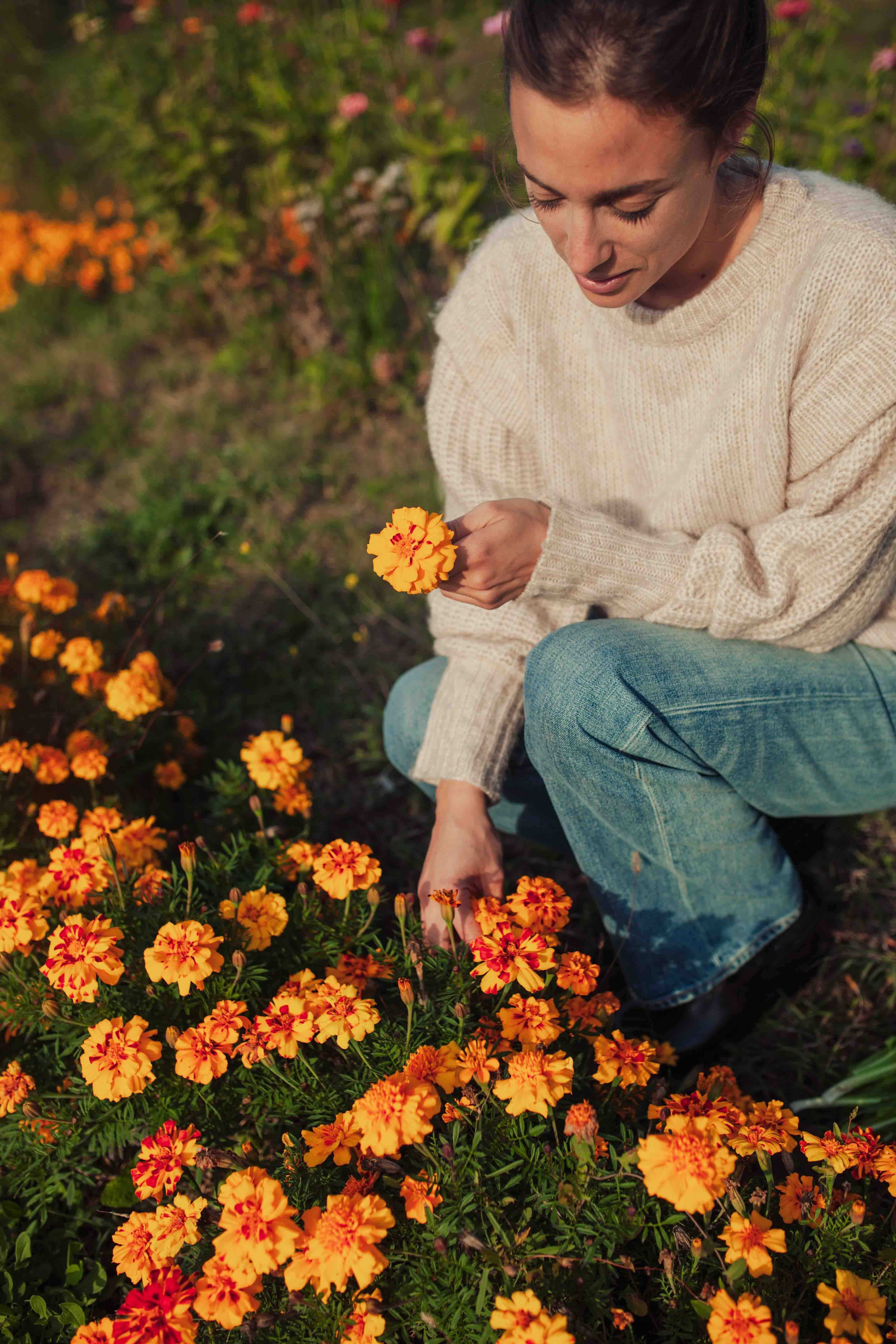
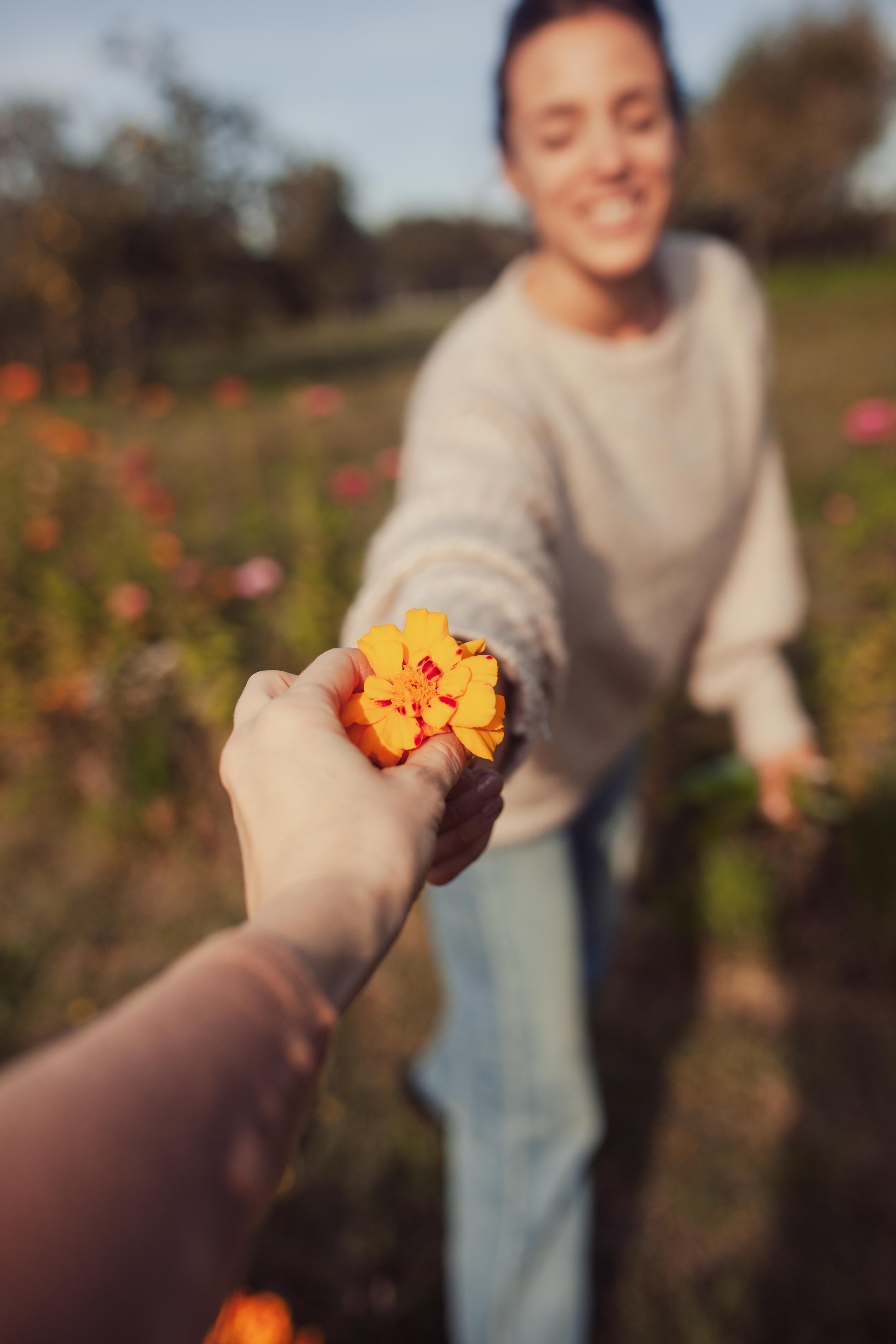
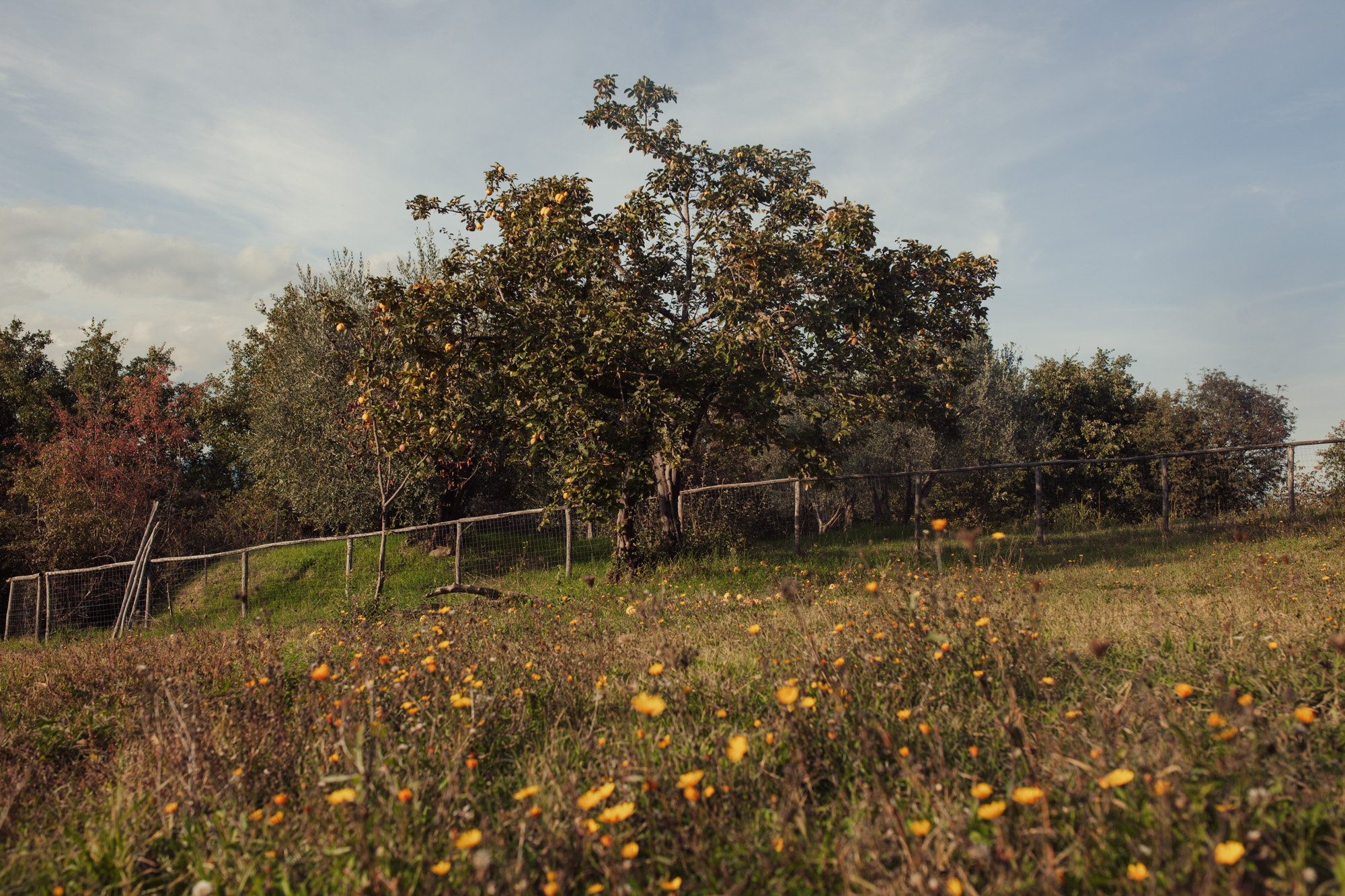 Quince tree at Maraviglia.
Quince tree at Maraviglia.When I visited in late October, the leaves and the weather had turned, so the focus too had turned to the business of making olive oil. Francesco and Francesca had gathered friends and family ready to work; they stayed together in the retreat centre and picked olives for eight hours a day for those few weeks of the harvest. Returning tired and hungry after sundown each evening, we'd share a big, communal meal around a long table with lashings of fresh green olive oil on top of everything. We'd go to bed by 10 pm every night in preparation for another day. Lunches were out in the field over a fire, or at home devouring Francesca's heavenly yet down-to-earth culinary creations.
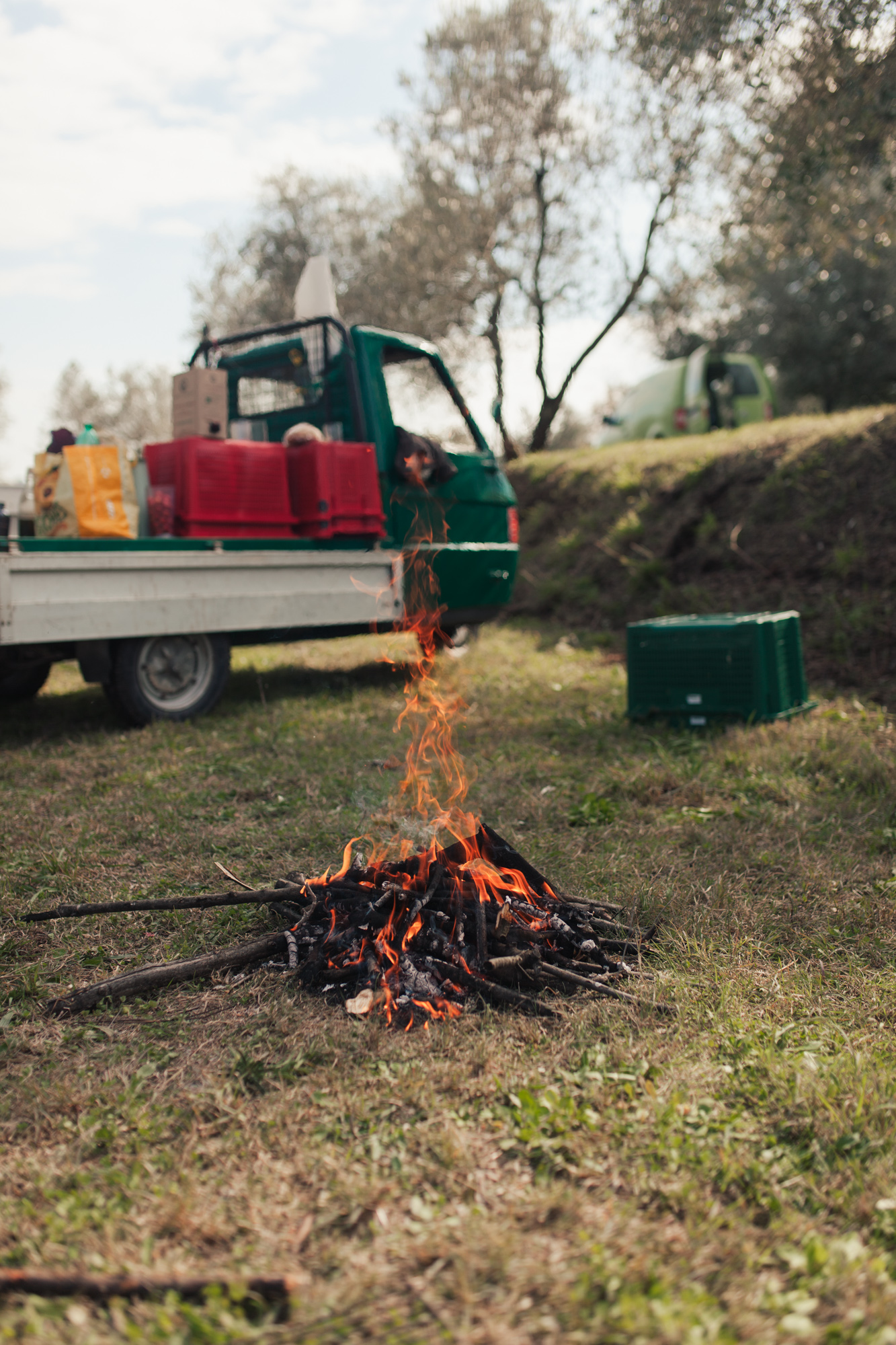
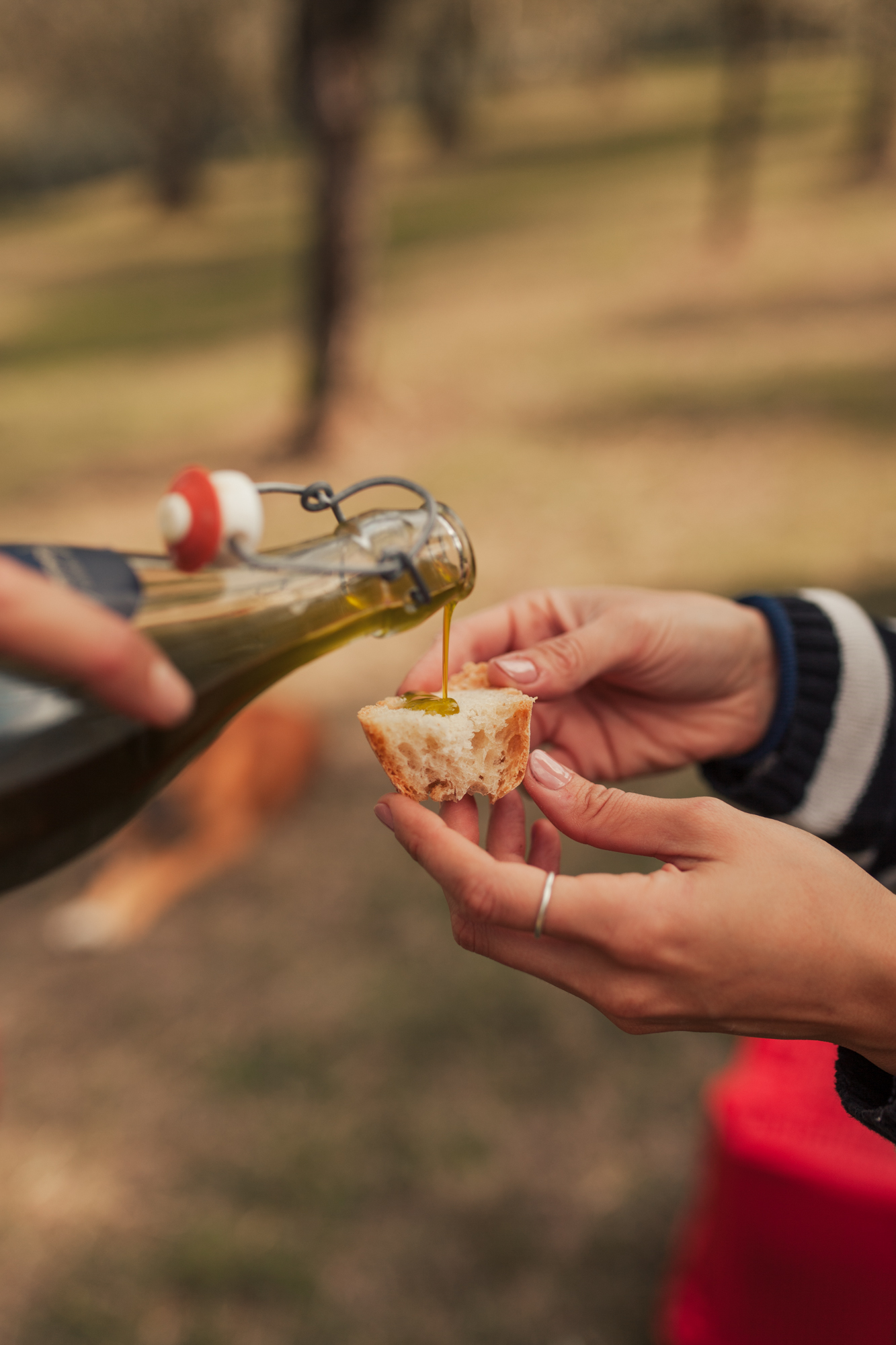
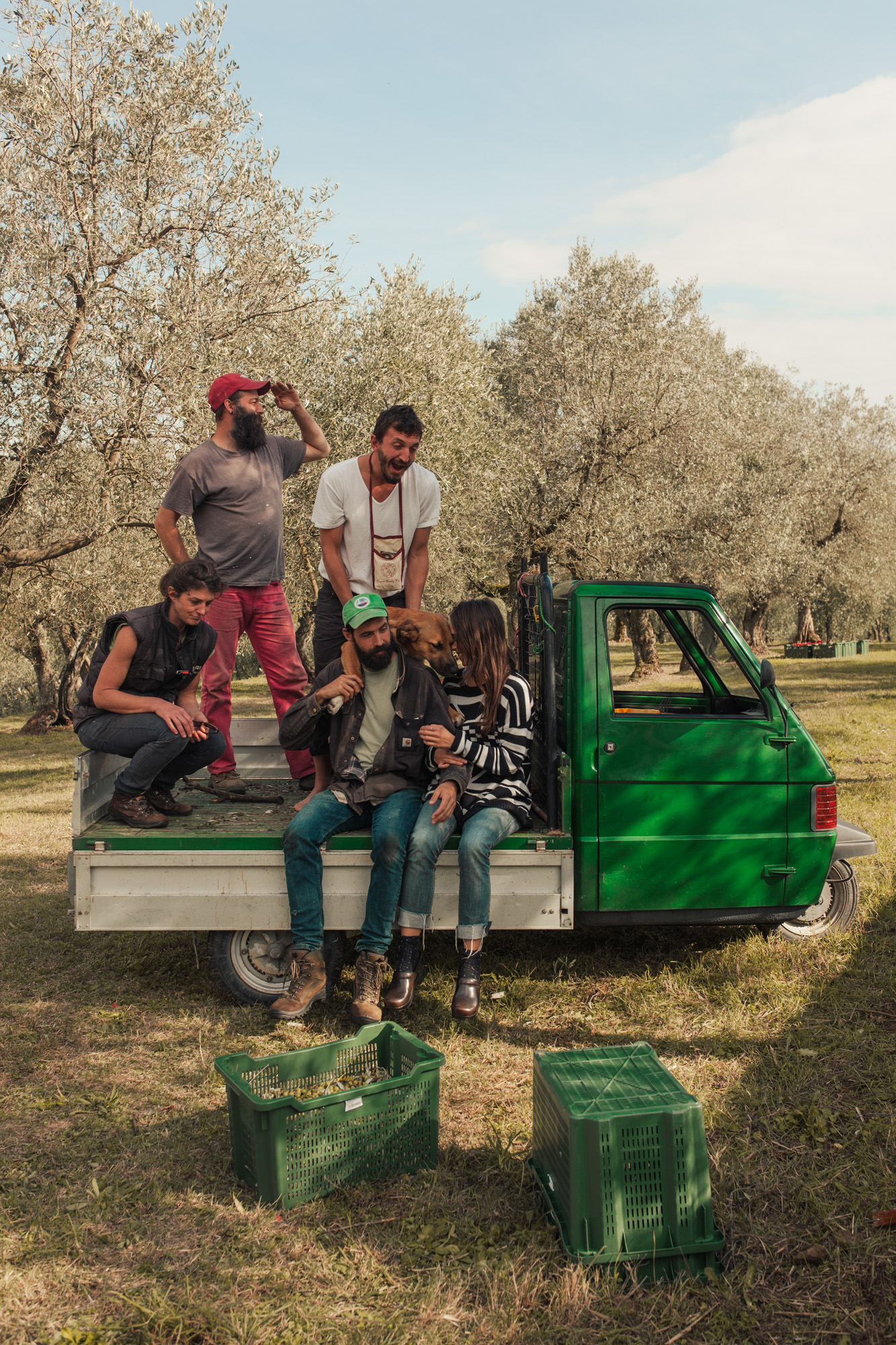
The olive-picking crew on a lunch break out in the fields.
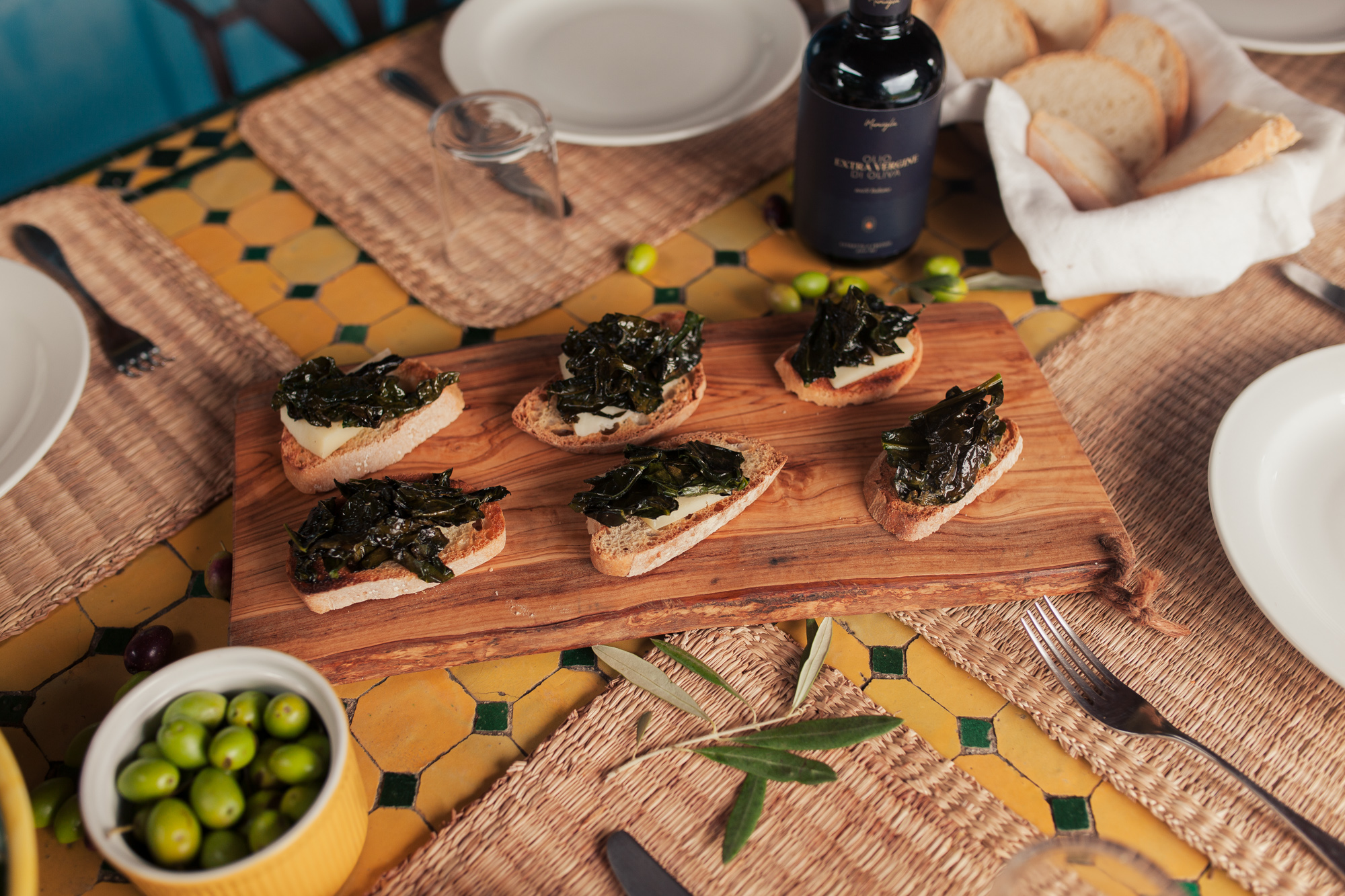
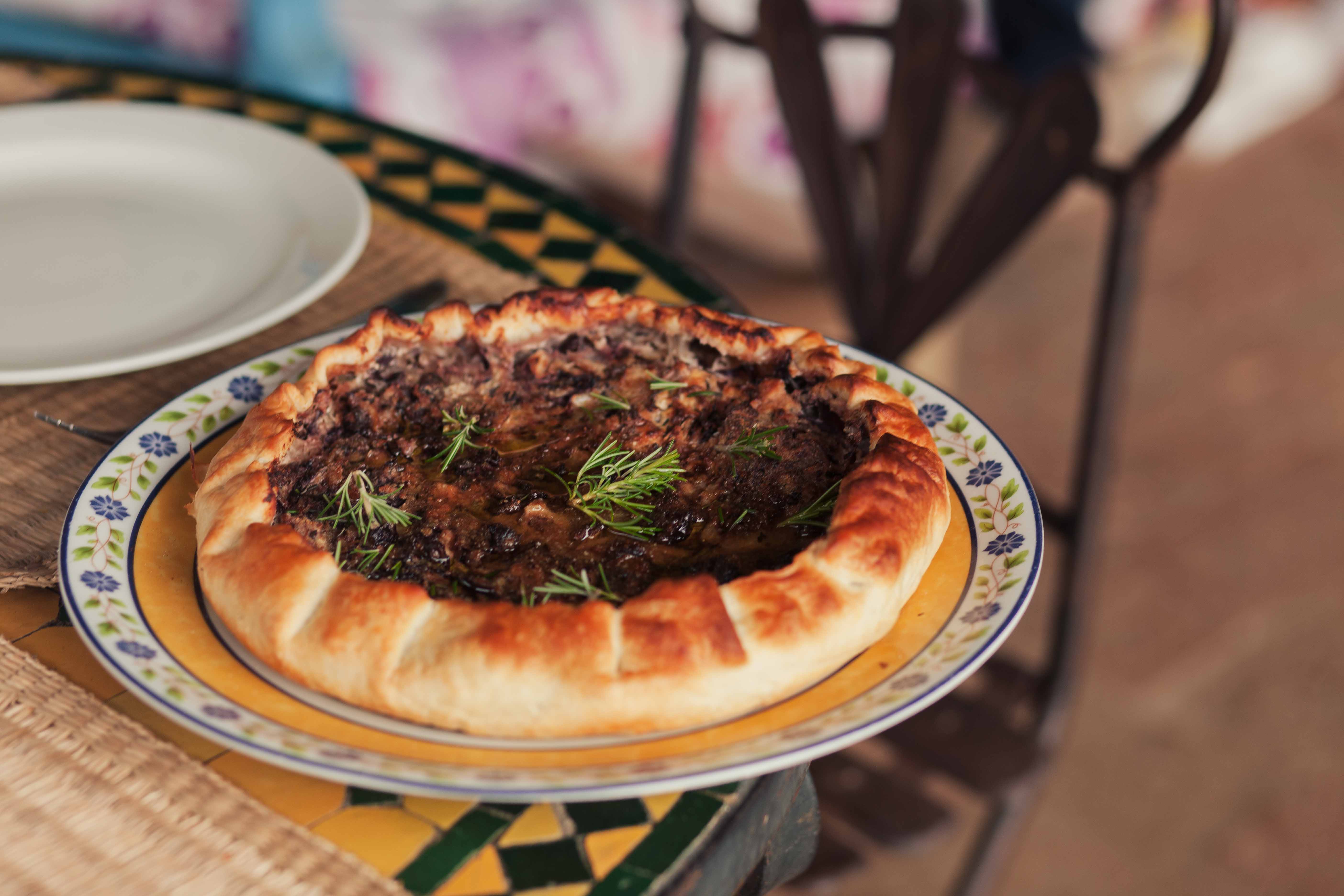
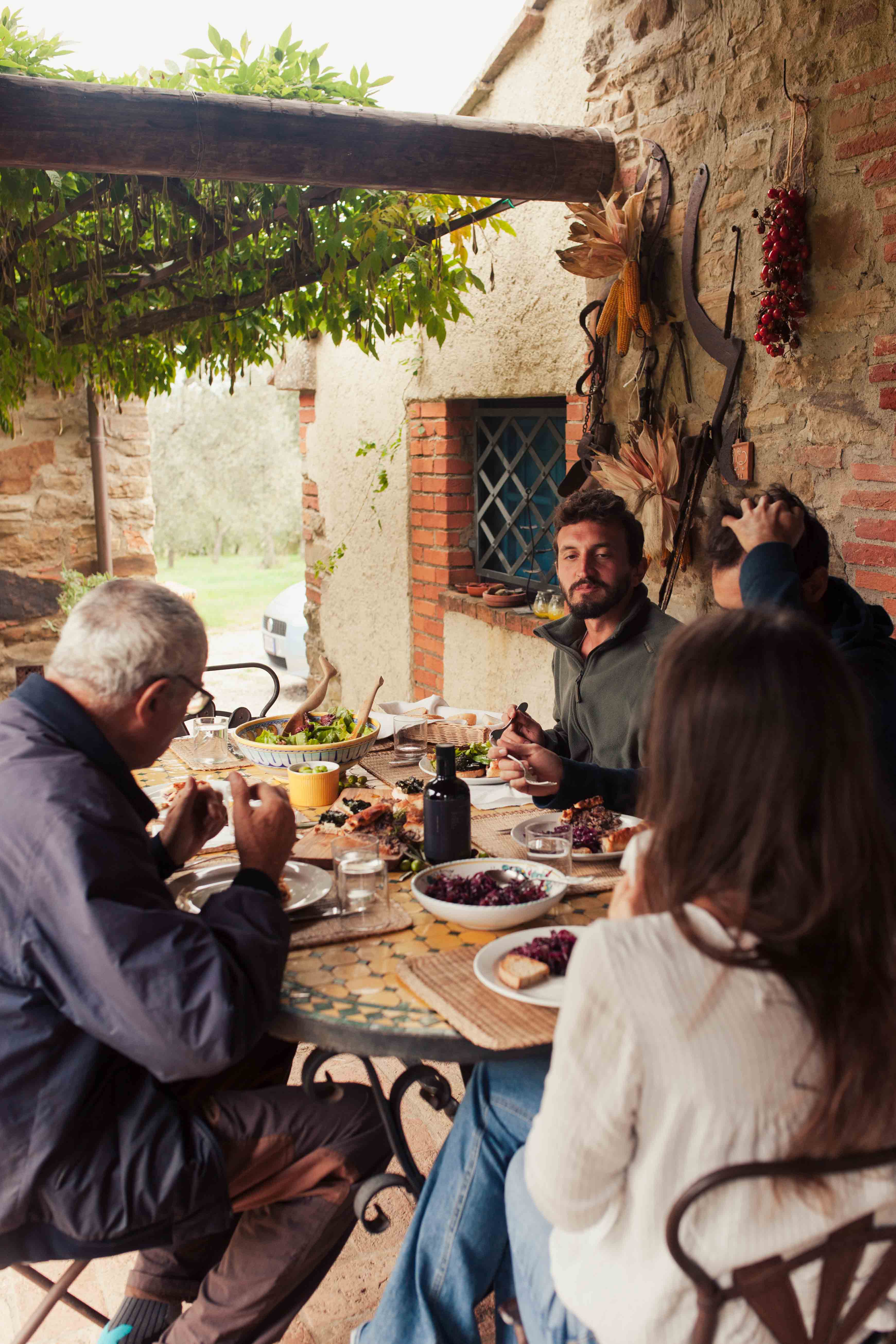

Lunch back at Maraviglia, eating dishes made by Francesca with ingredients from the garden: tuscan kale and pecorino crostini toasts, radicchio and ricotta tart and fresh green salad, liberally drizzled with Agricola Maraviglia olive oil.
I saw firsthand how hands-on the process of olive picking really is, something I'd never stopped to think about in my many years consuming it. I learned that you don't so much pick olives as you do shake and comb the trees, either with a machine if you're going high-tech, or with a mini rake in hand if you're going analogue. You then catch the falling olives with huge nets spread out on the ground below.
The race to try to pick the olives and divest each tree of its bounty as quickly and efficiently as possible is always on if you want to get those good, early harvest green olives everyone seemed so fixated on.

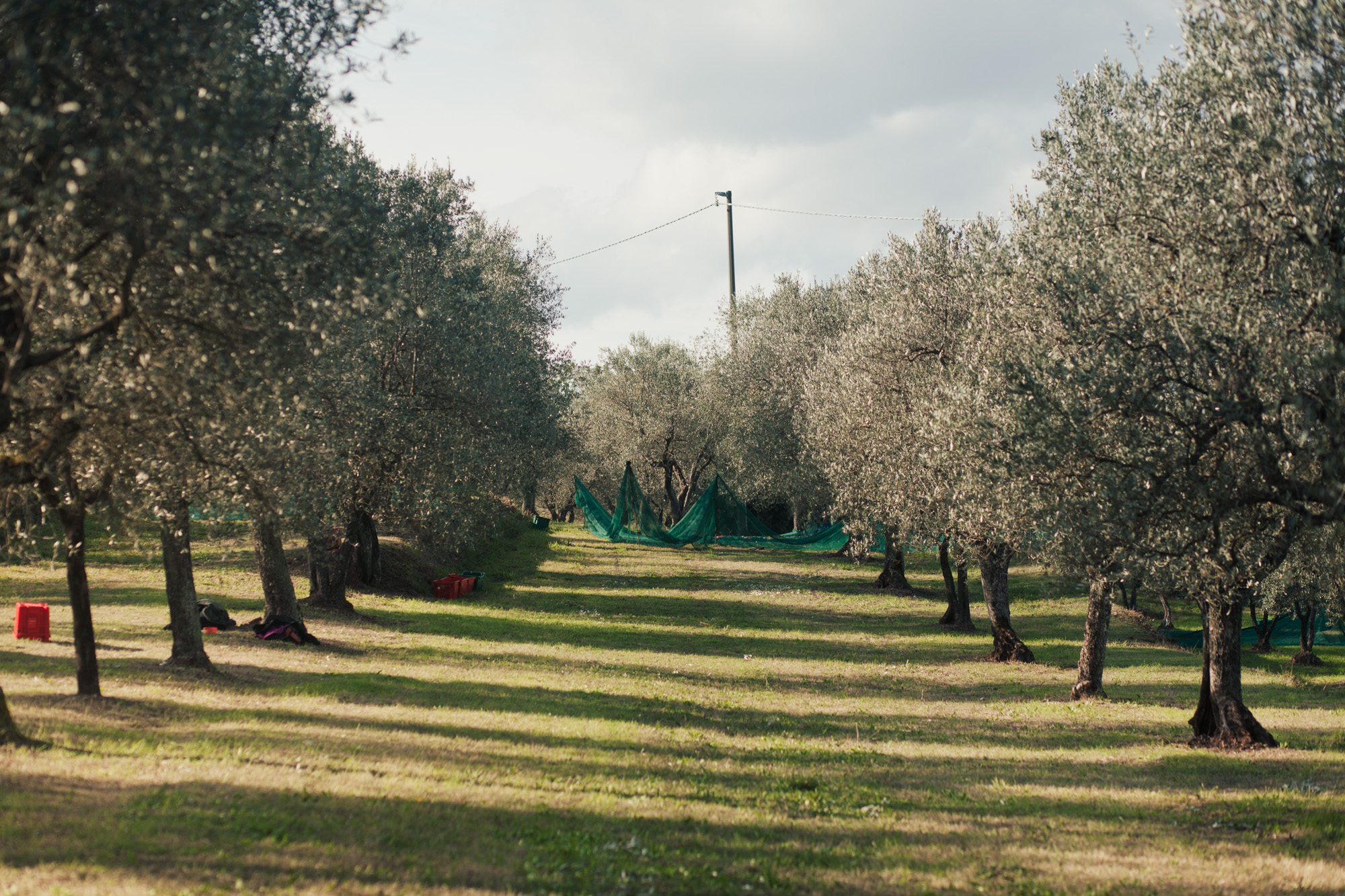
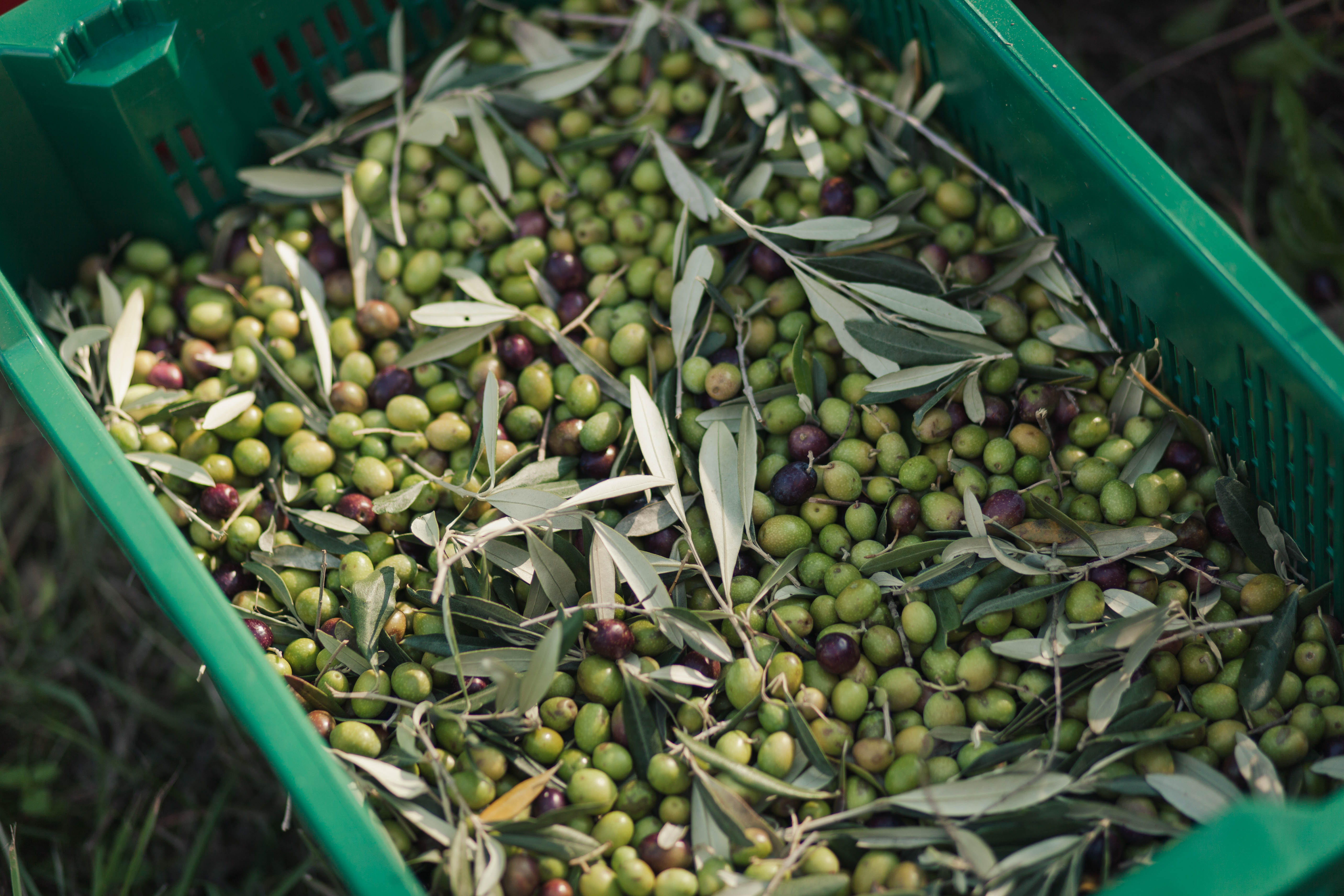
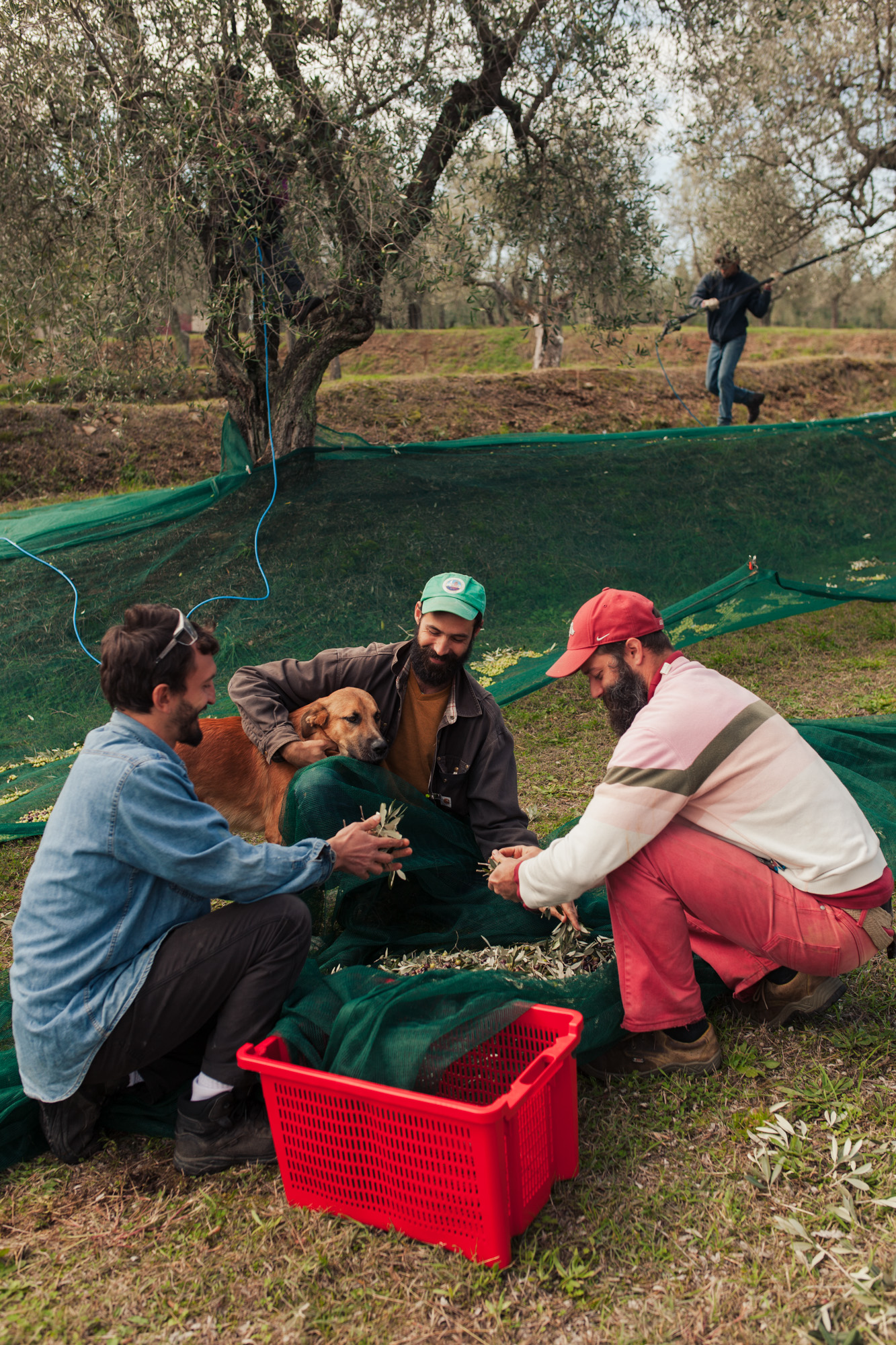
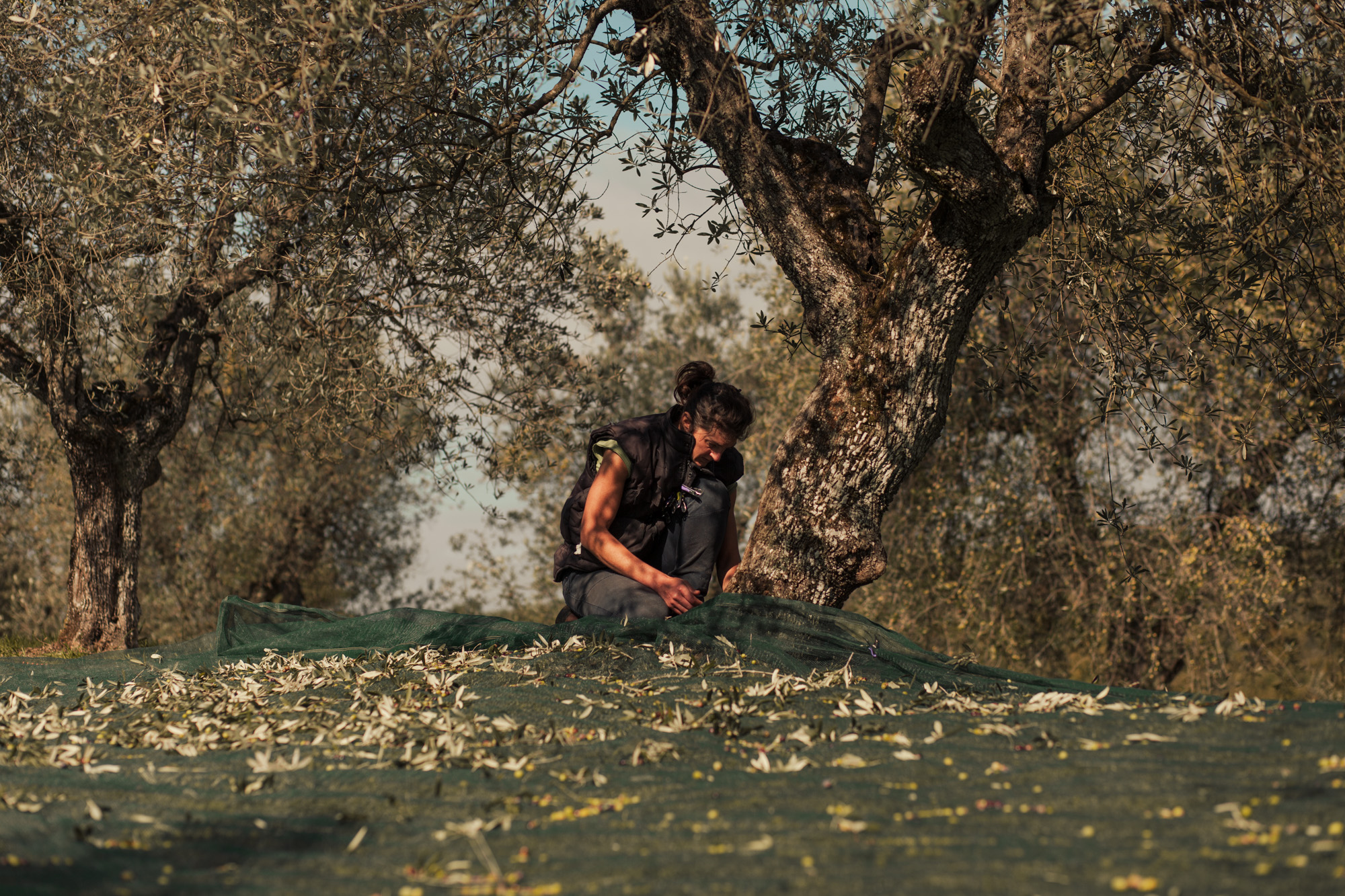
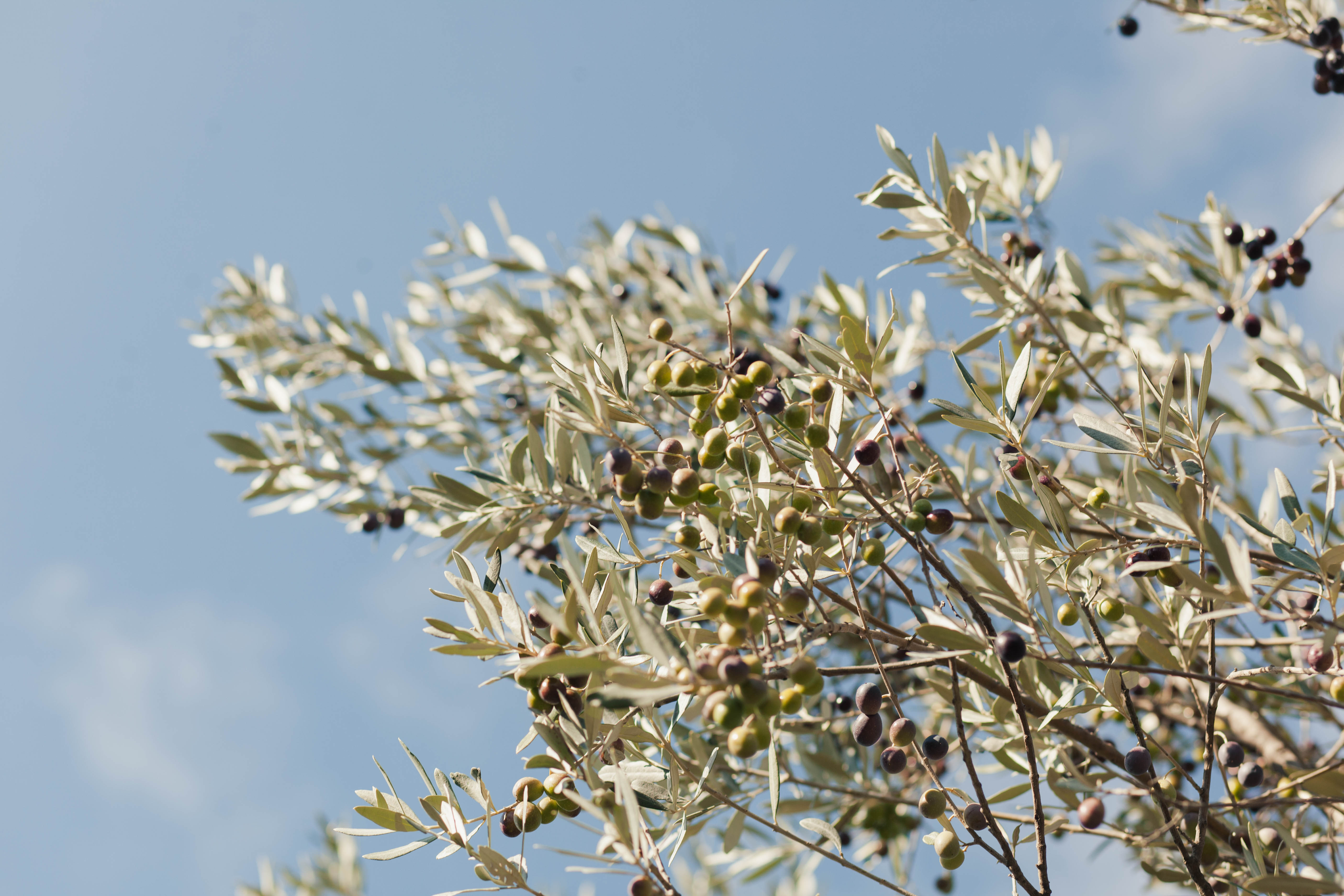

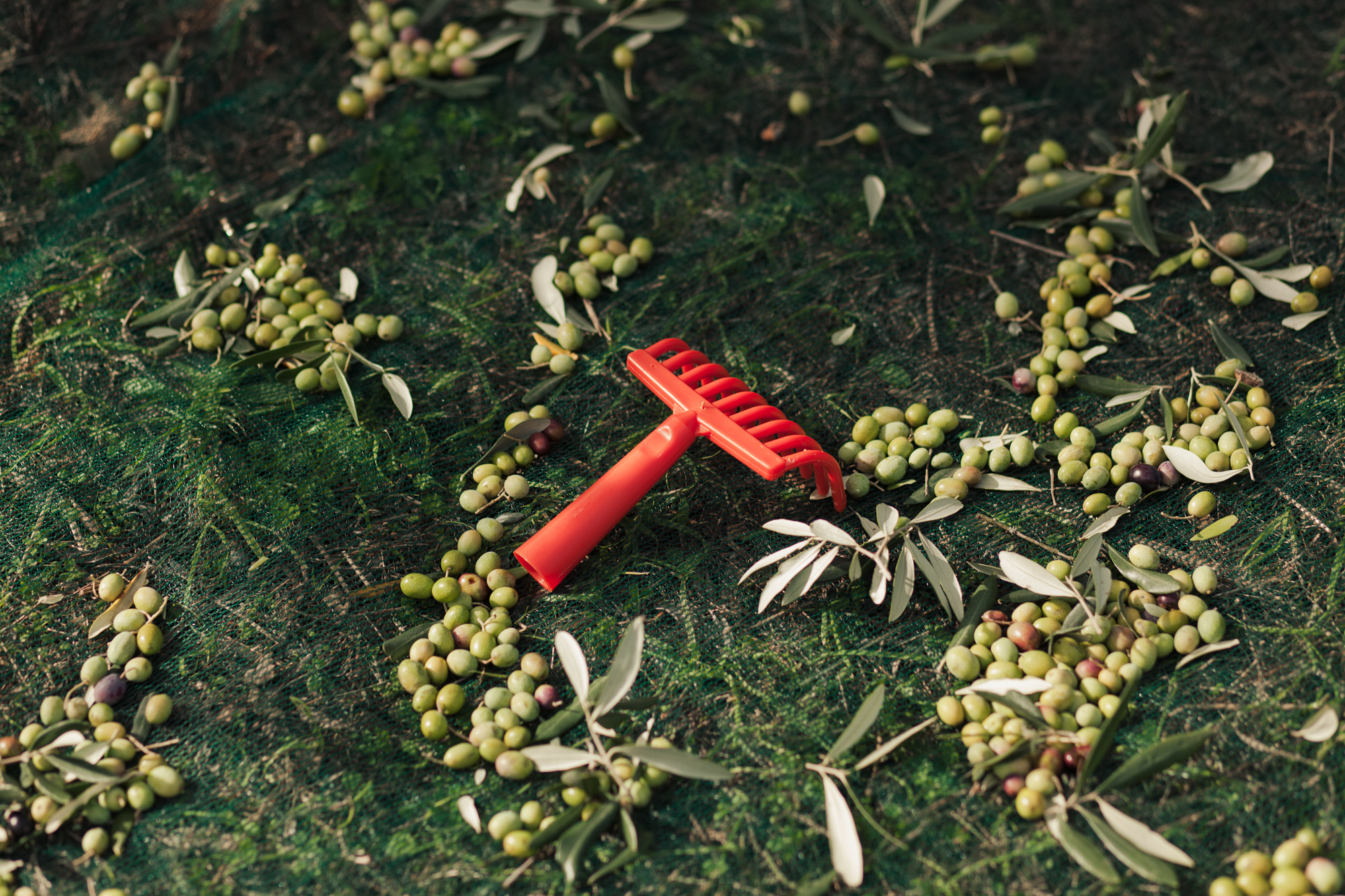
Olive Oil Made Differently
While this is the same picking scene you see all around Italy this time of year, after the grape harvest but before mushroom and truffle hunting season, these particular olives are destined for a slightly different course.
"In the supermarkets and, in the States, even in the gourmet stores, it's really rare to find (olive oil) products that come from one single farm.”
Francesco’s vision is to produce olive oil where the consumer pays the same price, but gets a top, ultra-premium olive oil from an 800-tree farm.
All this care and attention results in olive oil with a strong flavour all its own. I’ve learned since living here in Italy that this is the secret to Italian cooking – good quality olive oil with its own flavours makes simple dishes taste incredible.
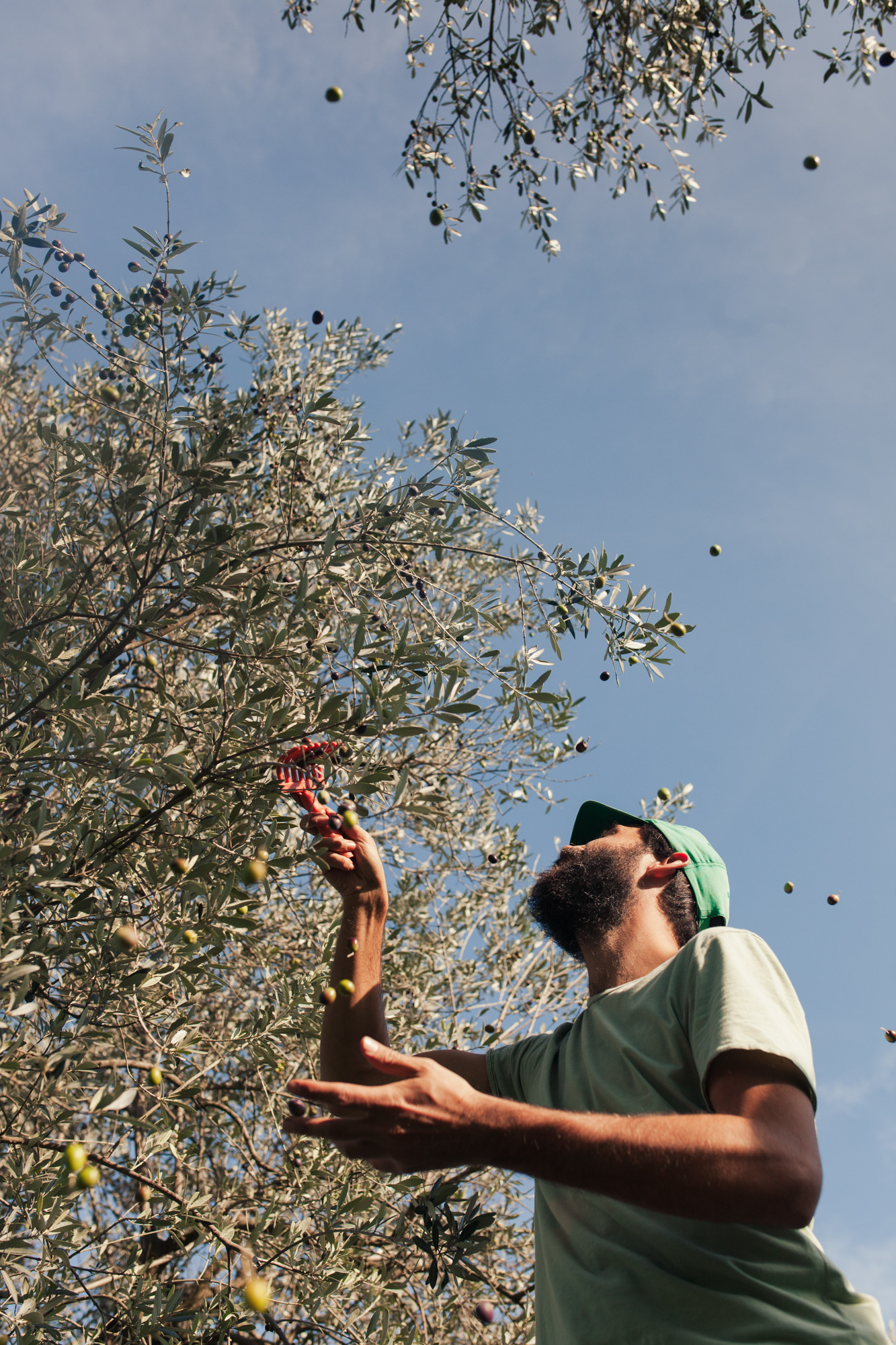
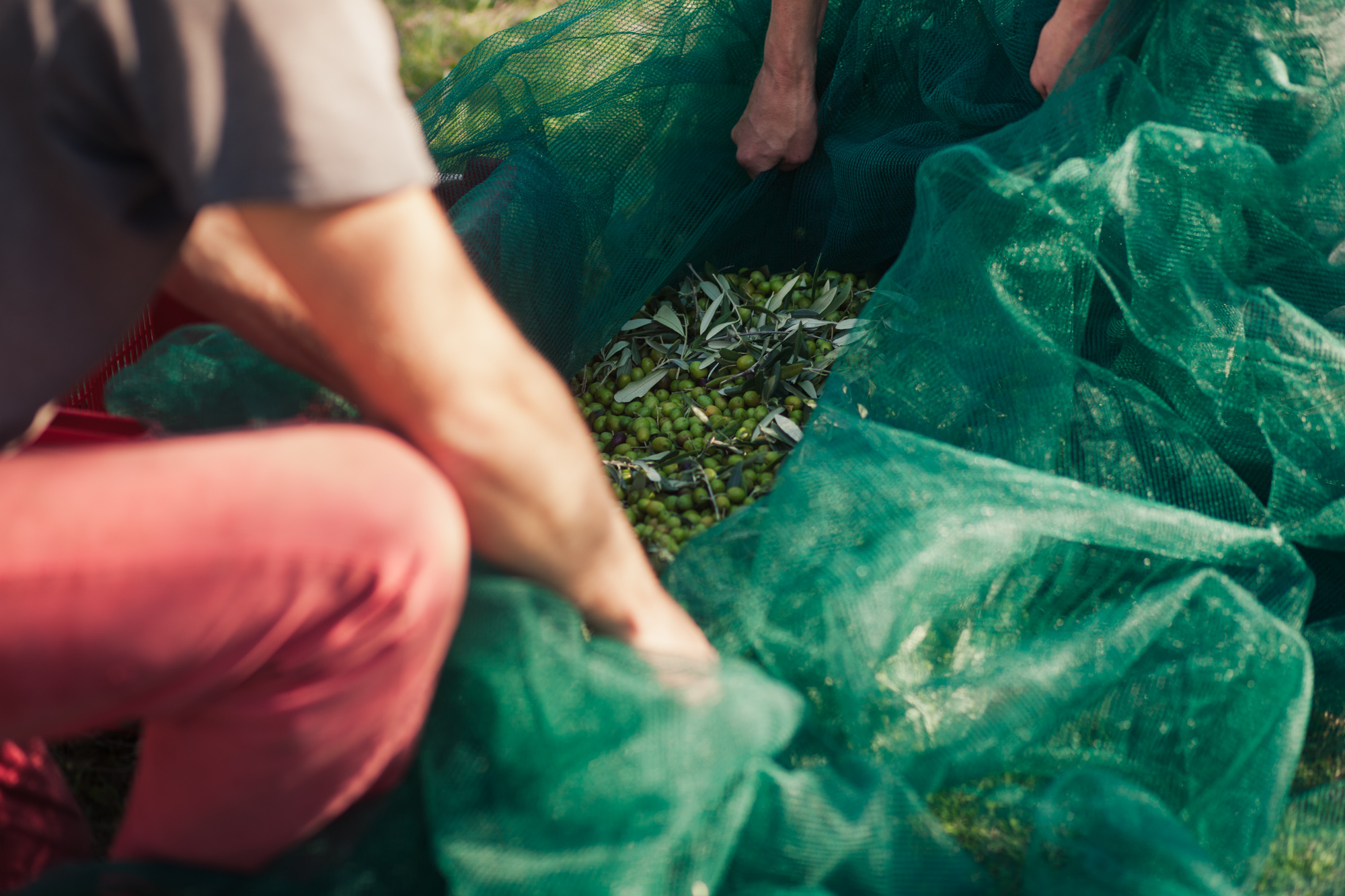
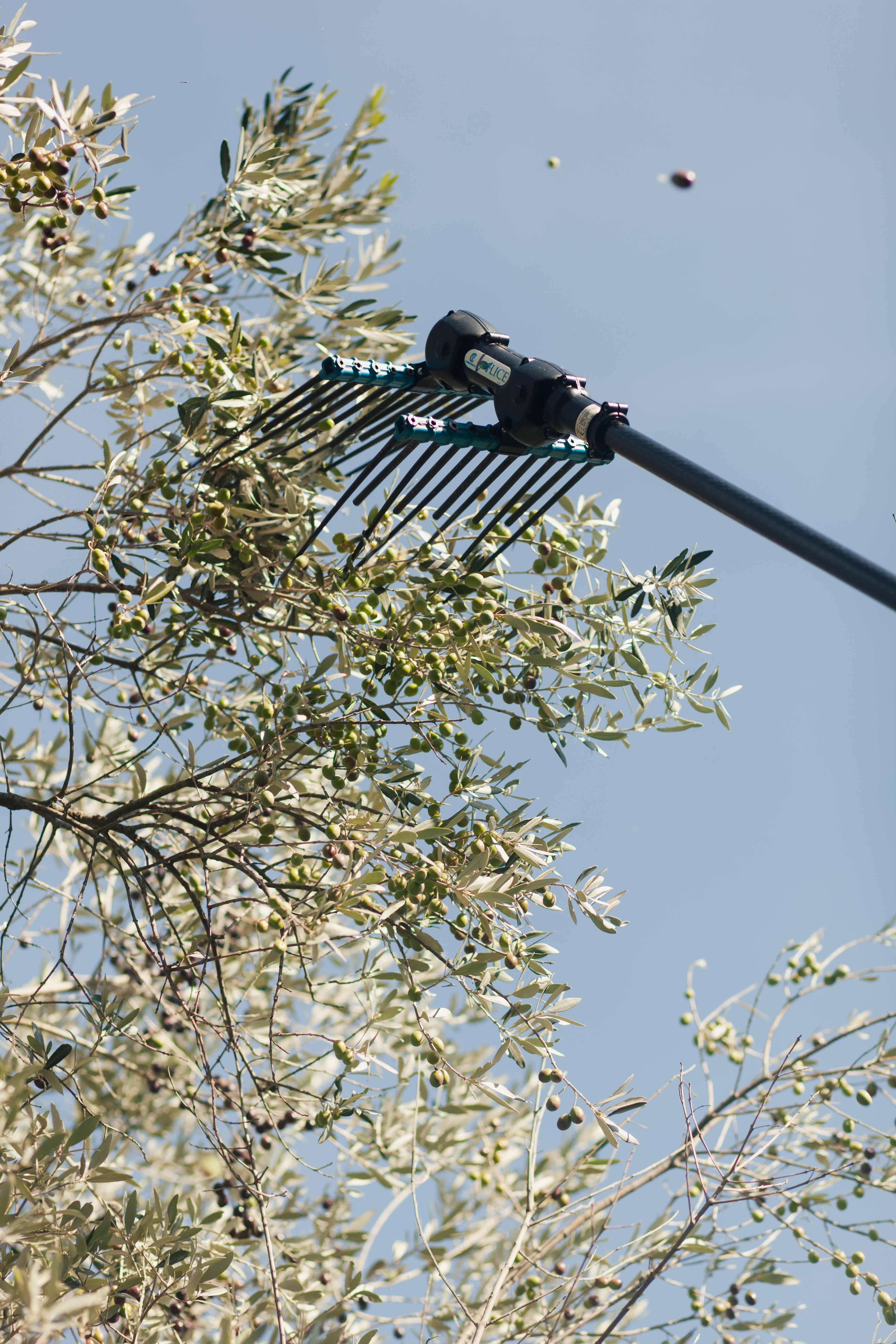
The New Glocal
Maraviglia’s direct-to-consumer model puts a new spin on an old idea.
Francesco referred to it as "Glocal": a localised, “mini-farm” product and business selling directly to a very international audience via online channels.
Francesco referred to it as "Glocal": a localised, “mini-farm” product and business selling directly to a very international audience via online channels.
Here in Italy, at least away from the big cities, they’ve been doing this direct-to-consumer thing since forever. Italians have their local winemaker, their ironworker, their shepherd who makes the good cheese, their butcher who raises his own animals. But the reach of these makers usually ends with the local area.
"They're like 80-year-old or 60-year-old guys that make an olive oil that is special. And they probably kiss every olive before picking it but they have no clue how to sell it. Or maybe they have their own channels of sales through the years that they built through word of mouth, but it's a local audience."
Because most of us don’t have our own direct ‘person’ to go to, we end up buying low-quality, industrial products from supermarket brands. But the modern world is beginning to work up an appetite for something real. We want to buy the good stuff, straight from the good people who made it. And with the internet, this is becoming more and more possible.
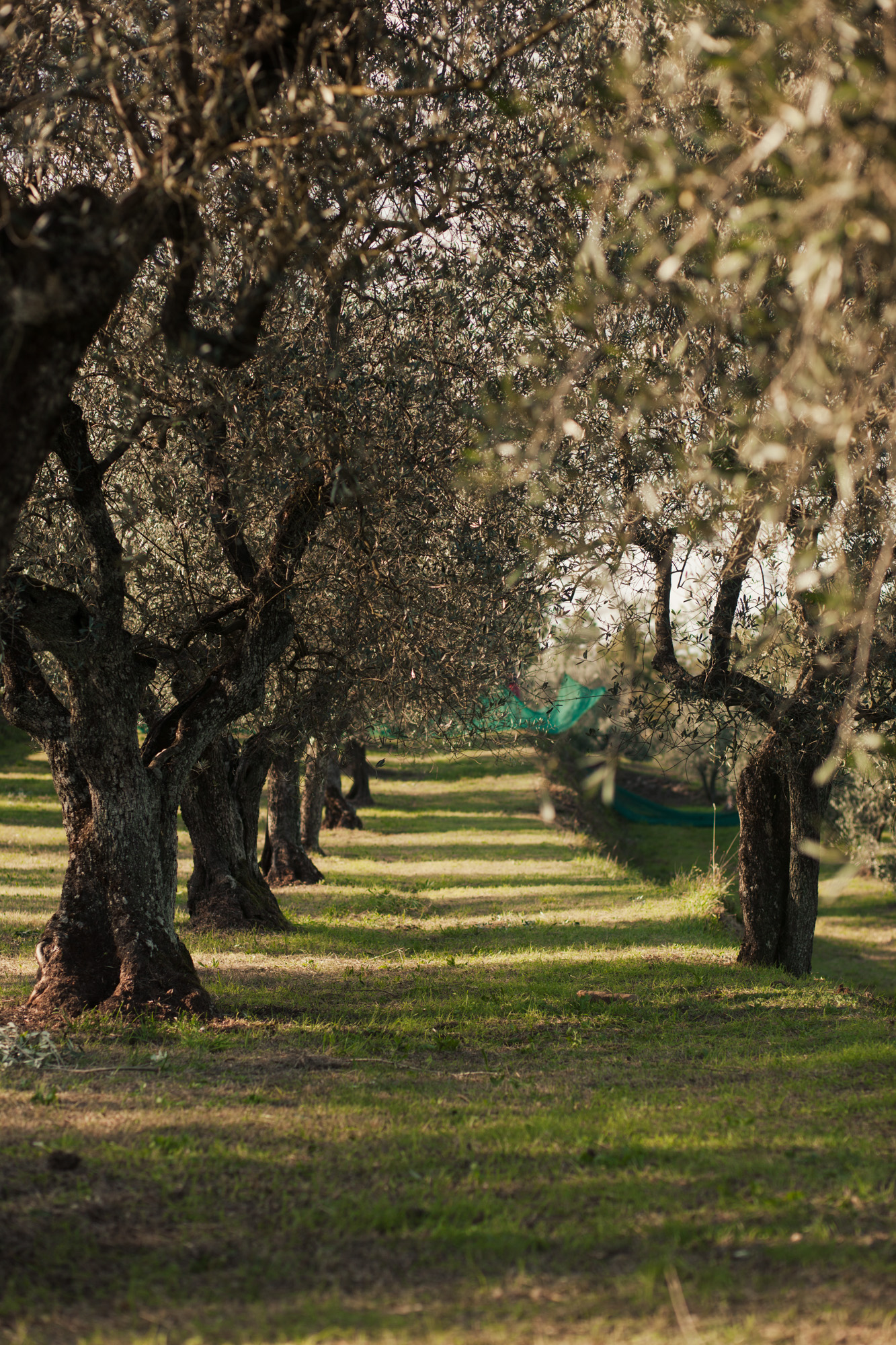
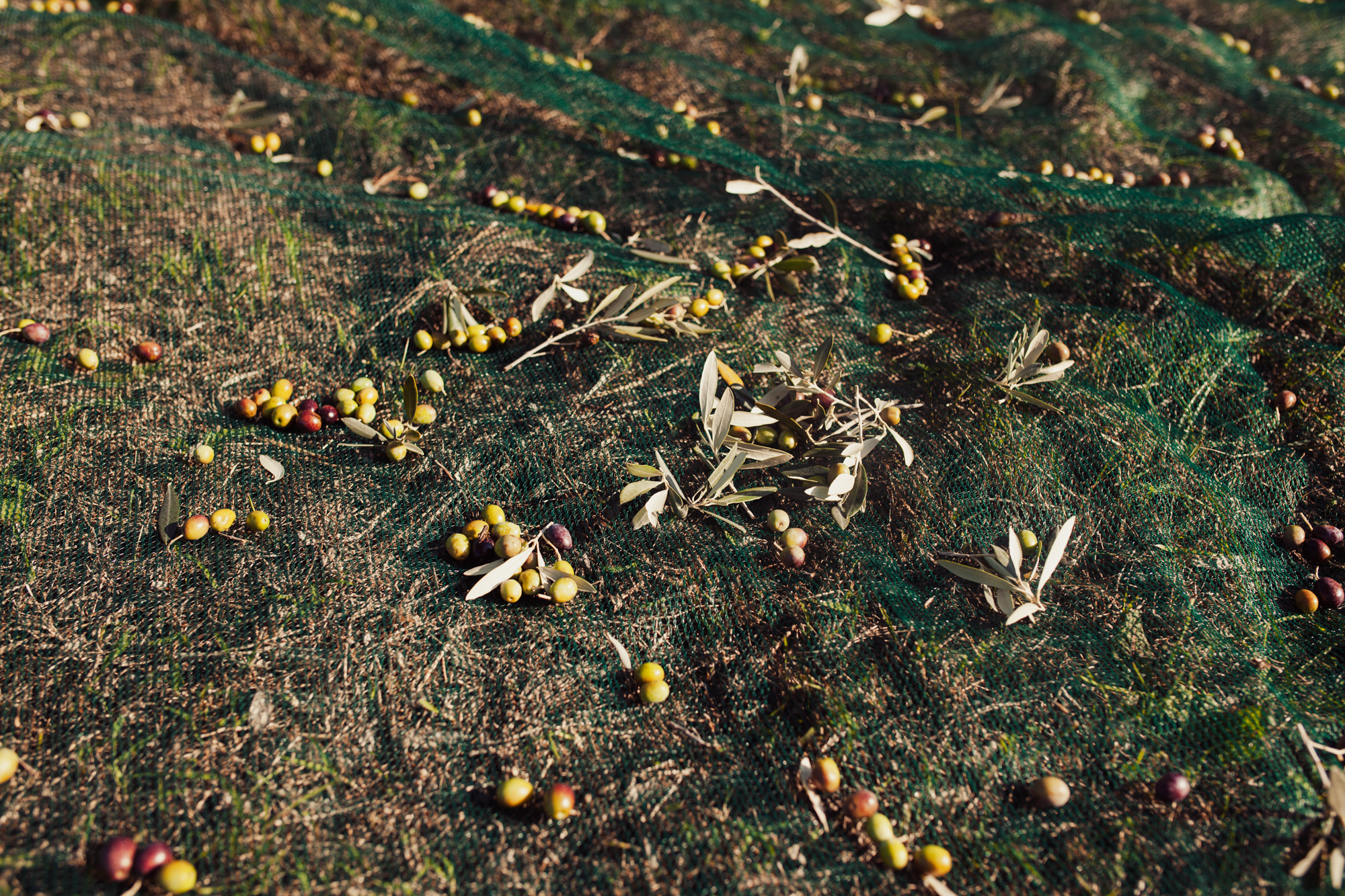
A Movement Away From Our Cities
A question I'd been dying to ask someone under the age of 55 who has, like me, swapped the city for a small town, was whether this was a cool, new thing to do, or just us getting old before our time.
Francesco reassured me, "I don't think we're getting old! It's definitely not a mass phenomenon, but it's a phenomenon that's becoming noticeable."
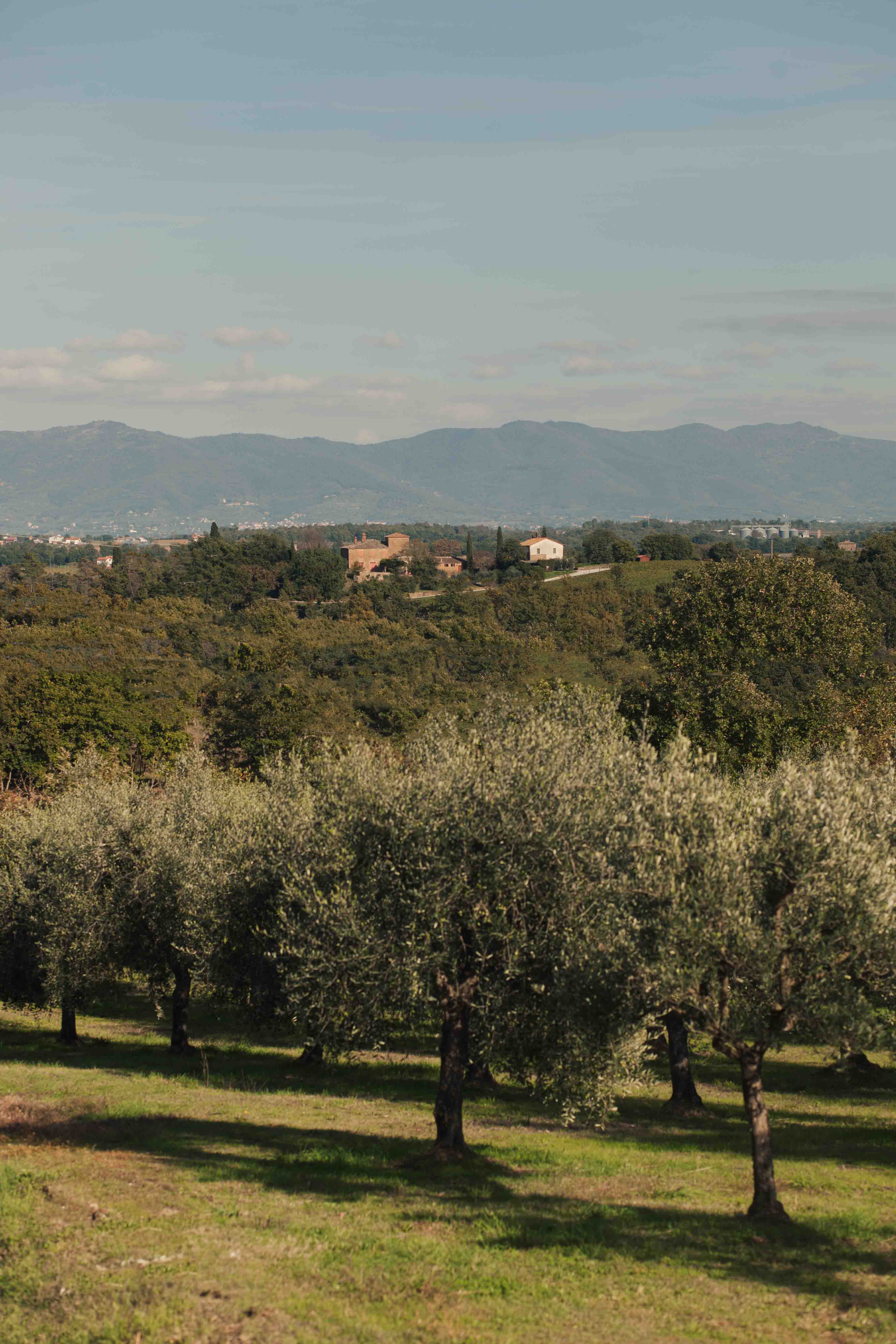 The Tuscan countryside backdrops Maraviglia’s olive tree fields.
The Tuscan countryside backdrops Maraviglia’s olive tree fields.It's a movement the pandemic seems to have sped up. Masses of people fortunate enough to have the means and privilege to do so, in the UK and the US in particular, have fled the cities as their office jobs turned remote and their tiny apartments became tiny prison cells.
What probably started as temporary moves allowed many to get a slice of what it's like to live in the country, experiencing firsthand the improvement in health and wellbeing and the freedom it affords.
I ask Francesco why he thinks this movement is growing at this particular time in history, aside from the pandemic's obvious effects.
"We are the first generation that grew up with the values and the teachings and the expectations of the nineties, which is what our parents lived and the big 'everything is good, the economy is going well, you make a lot of money, you have a career', the dream. And our parents, with that dream, destroyed the world and we grew up into that."
"We're also the first generation that as soon as you get out of high school you bang your head against the wall, right? ...It's like 'OK, everything that we thought we'd be doing: you go to university and then you study finance, you become a doctor, a lawyer... you do all of that and then you don't find a job and it doesn't work. And you see how everything is messed up."
In the absence of a big ticket job, and with a growing urge to connect with nature and ourselves, city life loses some of its pull.
We talk about the fact that living in big cities is making less and less sense to people who can work online or turn their hand to more down-to-earth work they can do in the country.
"Maybe you make less money than you would living in Manhattan and working for J.P. Morgan but you spend way less money to have the same things... Here you live in an incredible house with five times the space of your little apartment in Manhattan."

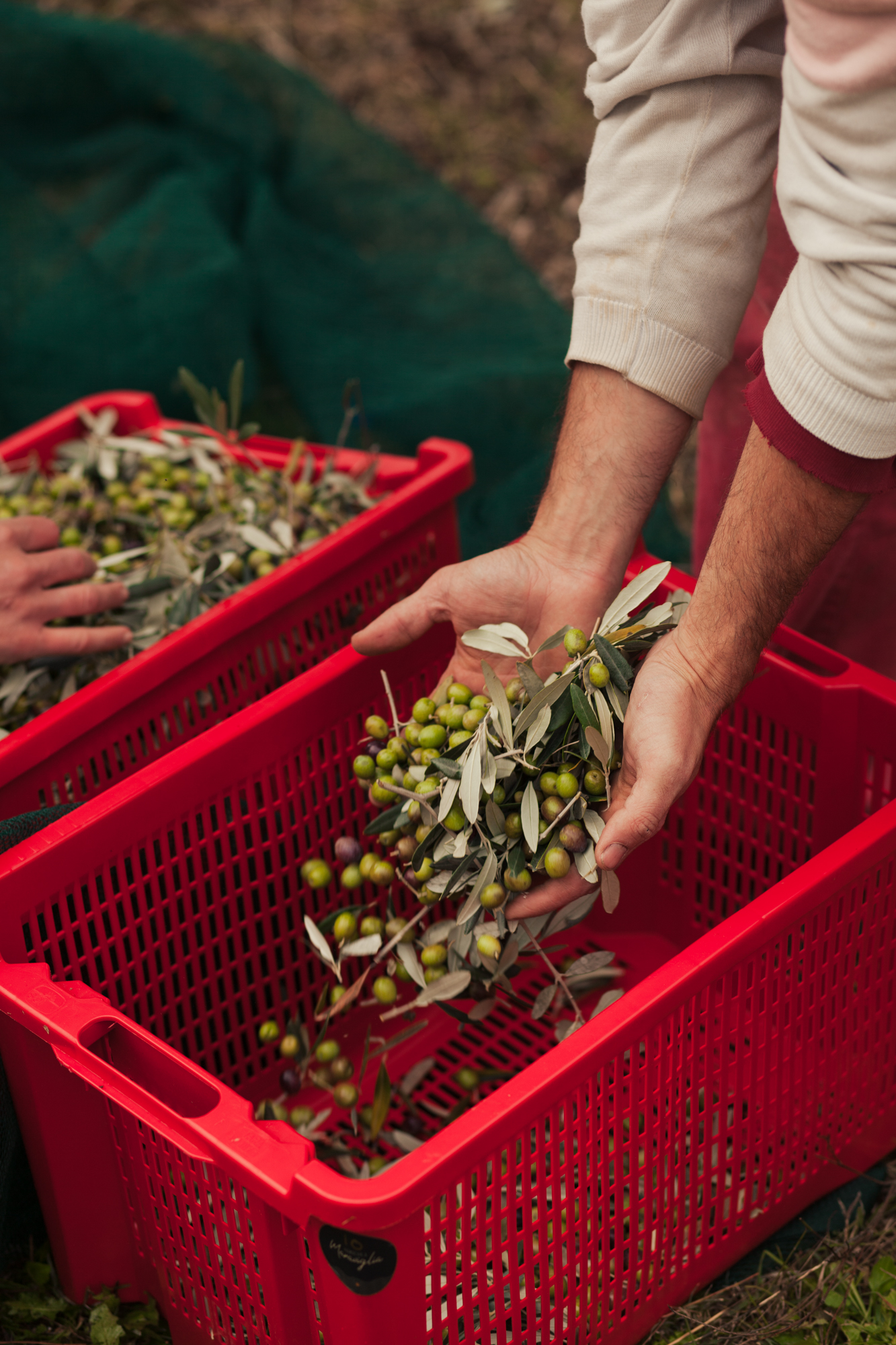
Sustainability Makes Business Sense
Our generation and the generation after us (à la Greta Thunberg and the school strikers) started with a pretty broken world, where the rules we were taught to follow were no longer applicable by the time we were old enough to live by them.
We can see and feel the full extent of humanity's rapid destruction of its own home over the last hundred years. But what are we doing about it? Are we, the younger generations, leading the world towards a new way? Francesco weighed in.
"We're seeing that there is this shift. And even business-wise and on the economy side, sustainability and the environment are one of the main topics... Conscious living, being aware of the food you eat, the seasonality of the food; this is a trend. It's big and it's going to get bigger. And business-wise, young people will be doing something (work-wise) that's more connected with the world that they live in and nature. They're going to be able to pay their bills. And the world is going to be healthier."
The online part of all this is integral, it's why we can imagine all these new ways of doing things. People like Francesco, with a mix of small-town roots and big city experience and networks, can create a new kind of business out of something that is traditionally agricultural work, thankless work. “Everyone that's older comes to me and says, 'Oh you're crazy to become an agricultural worker!' I'm not crazy. I'm not a kamikaze. I'm doing this because I love it and it's fun. But also because I can live off of it comfortably... There is a business, there just has to be a new model."
—
Agricola Maraviglia sell their organic, sustainably-produced Toscano IGP extra virgin olive oil direct to consumers worldwide via their website.
Maraviglia Concious Living centre is open during summer for retreats, listed here for 2021.
Maraviglia also runs an Olive Harvest Retreat every October (not this year due to the pandemic) where you can come and take part in the harvest, daily yoga sessions and sample Francesca’s culinary delights.
